#it could be 1990 or 2000 or 2010 who could say?
Explore tagged Tumblr posts
Text
Meet Cute in the Metal Pit
Steve didnt know what he was doing here.
Someone brushed past behind him, arm dragging against his back as more people pressed in on all sides, and he kind of frantically pushed out into a less dense area. There was feedback over the speakers as the crew checked the sound system, and he finally spotted Tommy and Carol approaching from the concession stand, a beer apiece carried between them.
Okay, so Steve actually did know exactly what he was doing here.
But playing reluctant designated driver and therefore blatant third wheel on his friends' dates was old hat by now -it started the first time they all went to a high school party and Carol accidentally got handed a cup with a triple shot of vodka instead of a single. Maybe it was better to say that Steve wasnt sure what all three of them were doing here, at this venue specifically, and not at some normal club or sports event or something.
Because they'd invited him last minute to what turned out to be a metal concert, and stranger than that, actually showed up on time instead of bailing completely or waltzing in after Steve was left waiting an hour and a half. Granted, they hadn't actually mentioned the bands by name or the dress code, which meant Steve still stuck out like a sore thumb in his polo and jeans amidst the sea of black denim and sewn on patches, so any credit he might've given to them was lost.
He'd be the first to admit they werent the best of friends anymore, and they tended to treat him accordingly, but it was hard to just drop people you'd known since finger painting class. Meeting Robin after high school more than made up for any of the times Tommy or Carol were vaguely shitty about inviting him out.
But anyway, the concert. Steve had spent the last fifteen minutes since walking in the doors wondering what he, and then they, were doing here, because as far as he remembered, both of his friends' music tastes were about as eclectic as his own -that is to say, Tommy had definitely told Carol more than once to switch frequencies when Mötley Crüe came on the radio. He was pretty sure he'd know if either of them were nursing some sort of hidden love of all things heavy metal or... screamy.
The guy standing just in front of him to the left was wearing a vest with a gigantic patch on the back that seemed to just be a mountain with a gaping mouth in the side of it, wide open with teeth made of rocks and naked people climbing up the cliff face. Steve really felt out of place in his white nike sneakers he picked specifically due to the fact they matched his watch band.
*
Preview of my latest steddie one-shot! I'll link it here when I get it up on AO3 -I don't make taglists :)
Meet-Cute fic on AO3
#stranger things#steddie#steve harrington#eddie munson#heavy metal#concert fic#the pit#meet cute in the pit at a heavy metal show?#musician eddie munson#hairdresser steve harrington#no upside down au#ambiguous time period#it could be 1990 or 2000 or 2010 who could say?#dare you to find an inconsistency >:3c
85 notes
·
View notes
Text
Let Free The Curse of Taekwondo: Things you didn't notice #1
Isn't this another K-BL where I'm internally squealing because of every single detail? You bet it is. You can read my other meta/cultural detail/Korean language posts for Love for Love's Sake, Time of Fever, Grey Shelter and Boys be Brave on my pinned post or hashtags^^ (I really need to organize it under one singly hashtag tho...)
I already talked about how impressed I am with the fact that this series has done their preparation job well, with props, settings, language, history etc.
It is about a countryside/small town in Southern province of Korea - because a lot of characters use satoori (southern dialect), almost all of them except for the main two guys. There is also a distinct contrast/conflict between 'fancy Seoul rich guys' looking down on 'Southern town'. Juyoung even was surprised Dohoi doesn't use satoori.

To which, he responded with 'You'll be uncomfortable if I use it". And Juyoung said there are plenty other uncomfortable things around here, beside understanding/listening to everyone using other accent xD Confusing Gaga translation errors, we meet again!

Actually, it's interesting because Dohoi's name is written 이도회 in Korean, which typically would be written as 'Dohoi' but pronounced as 'Dohwe' (think of surname Choi that is actually pronounced as Chwe), yet in the first episode I clearly heard them actually say 'Dohoi', letter by letter. Now I wonder if it's also related to satoori... I wish I could speak it, it sounds so cool tbh.

He actually said 'I'm not in a good condition', meaning his physical form. What do you mean, mood, when was that ever an excuse in sports..?xD
By the way, what is it with boys trying to get closer to other boys by buying them unusual ice cream?:') Okay, garlic sounds more weird than red bean one :D

Also, I tried to find the Hasong town they talked about but failed - maybe because of incorrect transcription or maybe they made up this town based on Uiseong - a small town close to Daegu which is famous for being the most famous garlic town, they produce a lot of it and garlic fame would be seen everywhere - so who knows, I bet they allude to this when Juyoung said 'why can't there be a vanilla garlic ice cream? It's like a collaboration!'
Another thing, I thought the time of this series was somewhere around 1990s-2000s (because I watched a movie in similar setting that was called 1997 year but they still used pagers, now that I think about it). It was also still the time where teachers could use physical punishment on their students, it's heavily highlighted but I don't actually know around what time they stopped... Probably in Seoul, they already were getting rid of it but in small towns it was old-school teaching, which is again why Dohoi tried to tell Joyoung out of it.
I'm not familiar when small laptops and phones appeared in Seoul but I think the series is actually somewhere around 2005-2010! Which would make sense, Juyoung got the 'cool' flip-phone and a laptop with Windows XP (released in 2001) but small town is still far from that, as they use landline house phones to make a call.
He also has mp3 player and as other tumblr folks figured out, he was listening and dancing to Jewelry song released in 2005 :)

And another thing that convinced me about the time era... the final scene!
Do you want to know why at the end of Ep 1 Dohoi smiled and laughed and ran to Juyoung even after so many exhausting days and neverending small miseries and a new loud housemate?
Because Juyoung not only came to pick him up with an umbrella in the acid rain, he also reenacted the famous umbrella scene from the classic romantic K-drama called "Temptation of Wolves" (늑대의 유혹) which was released in 2004! To make Dohoi laugh.
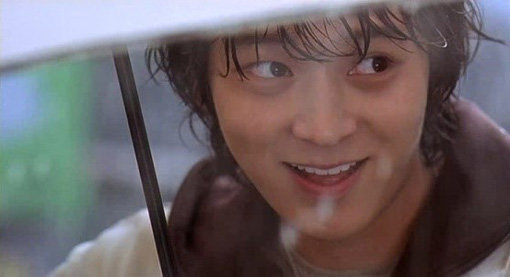
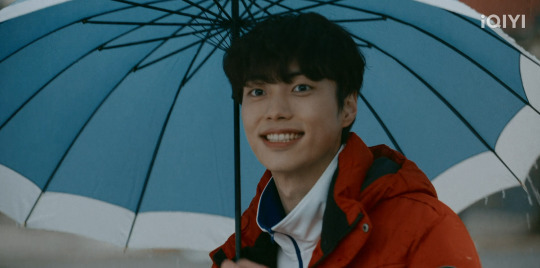
(Yes, when Juyoung intentionally put the umbrella down and the camera cut the shot to the framing when the umbrella slowly lifts up, showing smiling Juyoung, I was like 'you did nooooooot' xD)

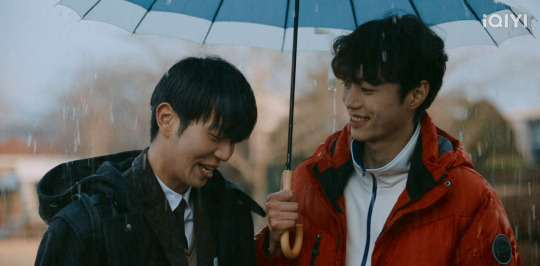
(last screenshots taken from @heretherebedork post, I'm sorry I am very lazy and cannot take a good screenshot for life :'))
So that was already our very first romantic teasing-implication!
Another cute thing: optimistic Joyoung wrote a diary entry into the fake old Korean "Facebook" (they had Cyworld instead) to share his first selfie with Dohoi:

"[Excited Shin Jjuyoung]" (typing in a popular back then teenage style) "I miss you guys... But here it's nice too hehe ^___^ Come to play with me!! Together with my friend Dohoi too~~!"
Aren't they the cuteestttttt? I mean, this dynamic is not new but I love how unique the setting is. And I can't wait to watch the second episode, I'm waiting and savoring the first one for now but I'm going to make notes about other episodes as well so stay tuned! If you reply/comment in tags, I will put you in my tag list^^
Tag list: @benkaben @pickletrip @troubled-mind
#let free the curse of taekwondo#korean bl#kbl#dropthemeta#dropthemeta kbl#lfct#lfct comments#let free the curse of taekwondo comments#bl series#juyoung x dohoi#shin juyoung#lee dohoi
311 notes
·
View notes
Text
Shadow's Future
I love Adventure 2 and Shadow’s backstory, with the things that surrounded Maria and Gerald, but I sure hope that Shadow Generations is going to be looking back for only one last time so it can fully move forward. So Shadow can move forward. After this game and all its promotional material (+ Movie 3), I want Maria and Gerald to be put in the vault once for and all and never be used in any official capacity again.
I don’t say that out of personal fatigue of their story and connection to Shadow, but for how complete it is by now. What will be left to explore? What else does this old story have to say that it hasn’t already since 2001? What could be added to this little bit of the greater Sonic the Hedgehog lore anymore?
(So help me if Black Doom’s part of the Movieverse)
Reply: pretty much. I think that at this point I would only like to see Maria in fluffy vignettes, like that drawing where apparently she and Shadow were attending lessons on the ARK. Less “yay white girl got shot again!!!!!1 wow so cool so sad this is proof sonic is actually Serious″ and more “you used to run down these slopes, remember?”, you know what I mean? I beg everyone, please see Maria as a character and not just as Shadow’s fridged girl.
On one hand, I know this is all just a big publicity stunt for the movie, and we don’t even know how faithful it’s going to be (leaving Gerald alive in the present is... a choice), so it might just be a one time thing. On the other, it’s undeniable that the most vocal part of the fandom nowadays is the one who looks back fondly to SA2 and its “peak writing” - in quotes not to mock it, but because it’s clear that what they mean is just the general dark serious “vibes”. There is the risk, then, that the 2020s will do to the 2000s what the 2010s did to the 1990s, except that now people will be happy because we didn’t learn a thing and those fans won’t admit they just follow trends :)
16 notes
·
View notes
Text
Mod Talks Mini:
//Hey, so I want to just send a little bit of a message to people, because there's something I need to let everybody know in a professional and calm manner, since I've been seeing a lot of controversy and messages online from people about this sort of stuff.
//Don't worry, this isn't anything serious, but I'm saying this for the sake of everyone's safety out there. It is kind of an edgy topic, so I will keep it under the cut.
//I don't really know how I should start this conversation, but I guess I should be giving a bit of backdrop for it.
//I recently found an old article online (several years back, I'm not even sure how I found it) talking about some other internet article pricks dissing Trey Parker and Matt Stone, the creators of South Park, for those who don't know.
//As everyone no doubt knows, South Park is notorious for its irreverent humor, often crossing lines with its dark satire, inappropriate jokes, and willingness to offend...basically EVERYONE. The show touches on sensitive topics like religion, politics, race, and SO much more.
//Parker and Stone have been judged harshly for their edgy, boundary-pushing humor, with some labeling them as cynical or insensitive, but the article I read was explaining that despite the controversial content they create, Parker and Stone are known to be down-to-earth and good-natured in real life. They’ve spoken about how their intent is often to challenge norms and provoke thought rather than to offend maliciously.
//And I can confirm this, because a few years ago, I watched this video that has always stuck with me, because these guys know what it is they're talking about, and it's why their shows and all the other stuff they make together are so successful.
youtube
//This however, also got me thinking about some people that I follow on AO3, and...Yeah, I know that's a weird jump, but let me explain.
//Archive of Our Own is one of the most prolific fanfic and writing websites on the internet right now, thanks to it's simplicity, and a few other aspects, but I realized that on that website, it is also grounds for some of THE most fucked up writing I have ever seen.
//I think we've talked extensively about LadyRedHeart on this blog before; very much still one of the BIGGEST examples of this. Most of her content consists of rape, pedophilia, torture porn, incest, and about every horrible variation of NSFW content you could think of.
//What I read in her stories, because I have read some of them, is repulsive. But...I've also come to realize very quickly that RedHeart herself is not the genuinely fucked person that she seems to be in her writing.
//And then there's myself. In the past, I've been harshly criticized for writing characters like Kuripa, and even my portrayals of some of the canon characters, even though it's all supposed to be my own take on it. I remember people being really upset when they found out what happened to Hibiki, and then Himiko, and I had to deal with a lot of shit from some people back then.
//But it's fine. It all worked out in the end.
//But then there's the complete inverse of this, and this is the important part, because this is some of the stuff we need to keep our eyes out for. But this is also the more sensitive part of the post, so avoid the next 8 paragraphs if you don't like hearing about this. But here are a few examples:
//Bill Cosby is an American comedian, actor, and producer who was a major figure in entertainment, particularly in the 1960s through the 1990s. He gained widespread fame for his stand-up comedy and for starring in shows like The Cosby Show. The show was groundbreaking for its positive portrayal of an affluent African-American family and earned Cosby the title of "America's Dad."
//Cosby's legacy was severely tarnished in the 2000s and 2010s when numerous women came forward accusing him of sexual assault, drugging, and misconduct. These allegations spanned decades, with many women claiming that Cosby had drugged and assaulted them, and he was eventually convicted for it.
//Jimmy Savile was a British television and radio personality who became famous for hosting popular TV shows like Top of the Pops and Jim'll Fix It from the 1960s through the 1990s. For much of his life, Savile was seen as an eccentric celebrity and philanthropist who raised millions of pounds for charity, particularly for hospitals. He was widely respected and even knighted by Queen Elizabeth II in 1990 for his charitable work.
//However, after his death in 2011, numerous allegations of sexual abuse came to light, leading to investigations that revealed Savile had been a prolific sex offender for decades. He abused hundreds of victims, both male and female, many of whom were children or vulnerable adults. Much of the abuse occurred in institutions like hospitals, schools, and even the BBC studios where he worked.
//John Kricfalusi is a 68-year-old renowned Canadian blogger, illustrator, and former voice actor and animator. He is the brains behind several popular cartoon shows in the 1990s and early 2000s. Kricfalusi is best known for creating The Ren & Stimpy Show, which ran from August 11, 1991, to December 16, 1995.
//In 2018, Kricfalusi's reputation suffered after Robyn Byrd and Katie Rice, two former Spümcø employees, accused him of grooming and sexual harassment. The pair went on to say that they had been minors at the time.
//And then of course, there's fucking Dan Schneider, a more recent example. He's a television producer, writer, and actor best known for creating and producing several popular Nickelodeon shows aimed at teens and preteens, such as All That, Drake & Josh, Zoey 101, iCarly, Victorious, Sam & Cat, and Henry Danger. His work was highly influential in shaping children's programming in the late 1990s and 2000s.
//However, Schneider has also faced controversy, particularly regarding his conduct behind the scenes. In 2018, Nickelodeon cut ties with him after a long partnership, due to I believe now confirmed allegations of inappropriate treatment of young actors.
//The point that I am trying to make here, is that judging a person's character based solely on the content they create can be problematic for several reasons. And it's not fair to judge a person based on what they do, or what kind of content they make, or for what audience, because in some cases, that can be dangerous.
//In their work, artists and writers frequently explore a wide range of themes, concepts, and emotions that might not always align with their own ideals or worldviews. Through experimentation and investigation, art can enable creators to push limits and question social conventions.
//The context in which content is created is crucial. Factors such as cultural background, personal experiences, and the intended audience can significantly influence the content. Misunderstanding this context can lead to unfair judgments.
//Many creators view their work as separate from their personal identity. Their content may reflect characters, scenarios, or viewpoints that differ from their own. This separation is essential for creative freedom and exploration.
//And people are multifaceted. A creator may have both admirable qualities and flaws, and reducing them to their work can oversimplify their character and experiences. Preconceived notions about a creator can lead to bias, impacting how their work is received. It's essential to approach content with an open mind, allowing for a fair assessment of its merits and messages.
//Content that sparks controversy or discomfort can lead to important conversations about societal issues. Engaging with such content critically can promote understanding and awareness rather than condemnation.
//Anyway, I ranted about this for way longer than I should have. tldr; Stay safe, don't judge people.
11 notes
·
View notes
Note
Any gif set ideas for older!Daniel and younger!Terry? I was thinking of “Daniel” from Happily Divorced or Ugly Betty and “Terry” from Crackerjack for instance haha. Maybe newly divorced, single dad Daniel finds himself pursued by a hot younger guy much to his confusion.
Hey nonny! I do have some actually!

The funniest thing is that most of them may be called older!Daniel & younger!Terry since I mostly gif TIG's filmography from 1990-early 2000s (when he stopped his acting career😤) and Ralph's filmography from 2000s-2010s.
Also my toxic trait is that I come up with AUs while making gifsets bc my brain thought some scenes would look interesting together🤣 All I'm saying is that I have some gifsets that's just absolute random without an AU planned, they just happened to have the same scenery to me wkdkwl
Now about the AUs
This one is based on Ralph being in his 50s here even though he doesn't look like that😅still let it be here
1. I'm a simple girl who is down bad for Terry McCain and have an idea for a Terry x Nick gifset. 2 actually. The one is about Terry being a criminal man mastermind obsessed with Nick and I've already made a gif for a Lawrusso gifset AU. Might do more in the future🤷

Or Terry being a partner to Nick.
Look at this cutie, should be protected at all costs! And Terry is the perfect man to do that🥰
While Nick takes care of Terry's depressed ass. What a duo!


(He's running to kick asses of those who hurt his bae. Good for him!)
2. Also Terry McCain and Logan Phelps. Let's say Terry is losing a case to a sarcastic charming lawyer and is Big Mad abt it XD


3. Def smth with Rock Hudson but it's one of those times when idl the plot, just the vibes. Let's say


4. I do remember I had smth with the gardener!Terry & divorced!Daniel heavily inspired by an amazing gifset but with KK!Daniel.
Or maybe not a gardener but a husbando helping his husbando with clearing out the dojo. But they look like of the same age here I'd say��


As for your idea, I've had it in my mind for a while but haven't decided which characters to use. Luke Potter and Terry himself are the best choices rn from all the movies with TIG I've watches so far.


Guilty of having not watched Ulterior motives, Avalanche, and Black Point for which I'm 👀 as they look like they could fit some AUs
I haven't watched Ugly Betty yet, but Ralph from Happily Divorced would be the one seducting Terry I'd say🤣
Added to my list tho!

7 notes
·
View notes
Text
Nintendo-vember Level 3: Dobson and his Toxic Nintendo Nostalgia
Nostalgia can be toxic. Now bear in mind, I did not say that it IS toxic, but that it can be toxic. This assumption that because we have pleasant memories of something, that it was always good all the time. A desire to get that back, ignores all the good that’s come since then. As well as all the bad stuff that was there too. And it poisons you. Making you more suggestible to deception and your own greed. Who is to say that your own past is more important than someone else’s future? And because you want something that may not have been real at all, the farther the goal post gets. Because you can’t really reclaim it. So it just gets worse and worse and you get greedier and more desperate for it, because what you really want is never going to come. Until in the very end, you become the thing you hated in the first place. Lewis Lovhaug – March 2018, Infinite Crisis
Everything I did for this month so far, was going to lead directly into today’s , actually long in the works, post. Cause today we go over the comic, that as far as I see it, may actually be Dobson’s most (in)famous one out there. The one that painted the public’s opinion of him more so than anything he would ever do when starting to draw “political comics” under Trump. The one that defined him for all of deviantart and kiwifarms from 2010 onward. A comic that will always show up, whenever someone online even remotely talks about him. The one that I have seen more times than any other being used for threads on /co/ for Dobson. A comic that is neither about politics, feminism or even part of any of his comic series. A comic that is truly centered around the concept of toxic nostalgia, rather than whatever Andrew Dobson was going for and that fits perfectly to the theme of this month.
Ladies, gentlemen and inbetween… I give you, the Localization one.
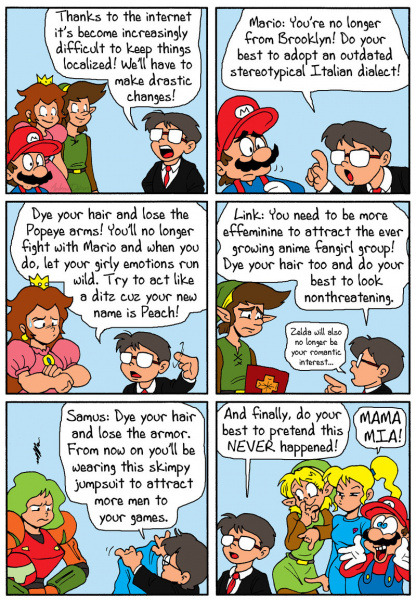
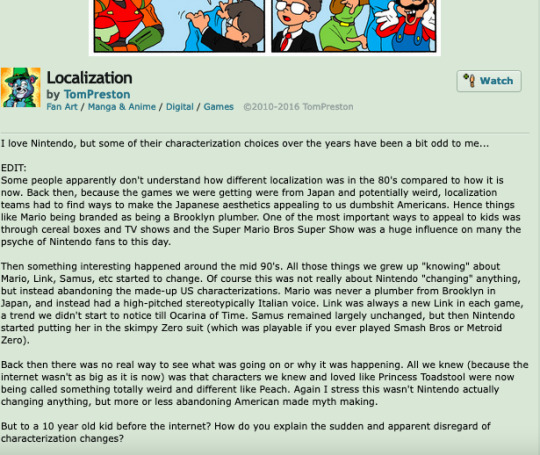
Released in 2010, a time when Dobson was still trying (and failing) to sell himself more on the image of just being a quirky nerd and Nintendo fanboy whose work you should support because he only wants to make others happy, this became a comic that genuinely cemented further in the eyes of others, how much of a self-indulgent and extremely manchildish prick with dumb taste he really was.
How, some here may ask who are a bit too young? Well, let me give you context…
For starters, by the time Dobson released the comic, he had already quite a bit of a reputation online for being a prick to other nerds. His infamous “West vs East” comic which he created “as a joke” to vent about the popularity of anime in the mid to late 2000s had been published three years prior and had, in combination with a lot of derogative journal entries and posts on deviantart and other pages, earned him the ire of many people. In addition, his failed or outright aborted “original” content had painted him as a quitter, who despite wanting all the fame someone could muster online, was not willing to put the necessary work in it.
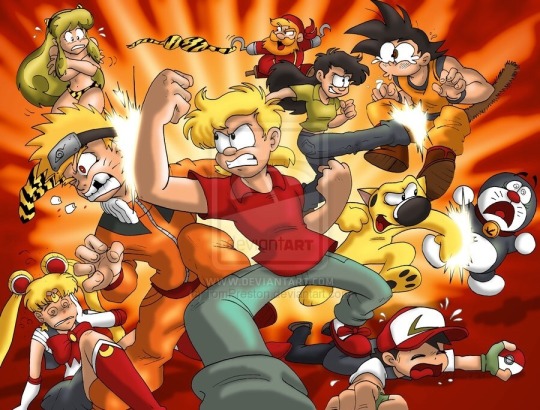
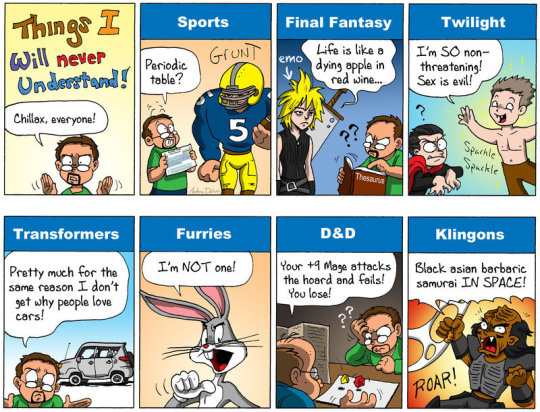
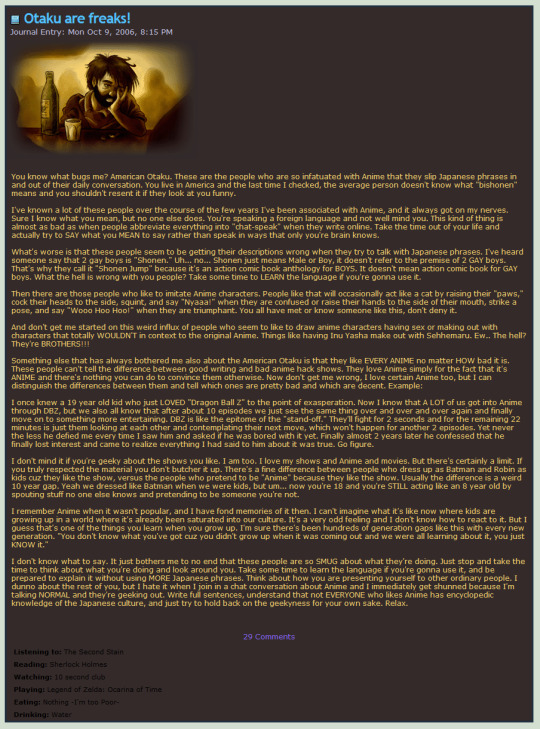
Dobson was, for a lack of a better word, a bully among nerds who tried to use his platform to shame people for being “nerdier” than him or enjoying stuff he didn’t, while also playing the victim card for people not interested in purchasing his product or calling him out on his hypocrisies and flaws in opinions.
In that regard, Dobson was pretty much ahead of the curve to some “woke” companies. Insulting your customer and then being surprised when no one wants to buy your shit.
The other thing to be aware of, has to do with the history and popularity of Nintendo characters at least pre-1995 in America.
For the few not quite aware and as a quick reminder to everyone: Videogames back in the 80s and very early 90s (like 1990-92) did on average not necessarily have what we can call “complex” lore when it came to videogame stories and characters. At least not to a degree as we would get later in the mid-90s and onwards. Aside of (J)RPGs most games were simply focused on moving a character from one end of a level to the next and the story as to why we even bothered for Megaman to fight the Robo Masters and who the heck Dr. Wily was, was printed in the manual on a small page.
And Mario and Link were no exception to that. Mostly because they also had only very few genuine main titles under their name. By 1989, The Legend of Zelda had only two NES titles under its name, while Mario had (if we don’t account for non-jump n’run games in which he was shoved into because of his status as Nintendo’s mascot) the three main Mario Bros games for the NES, one game for the Game Boy, Mario Bros and the two Donkey Kong titles.
Lacking quite a bit in characterization game wise, Nintendo of America in order to sell the stuff had to partly make the characters appeal to the audience via localization done through merchandise and non-game related products. And early fans of these characters would obviously crave for it.
Enter The Super Mario Bros Super Show, a cartoon series produced on order of Nintendo of America by Haim Saban and DIC Enterprises (the same ones who would give us “The Adventures of Sonic the Hedgehog”, “Captain N” and “Inspector Gadget”) that ran from September 1989 till December of 1989. Using the first two Mario Bros games for the NES as basis for the character design of the show, the show itself had otherwise little to do with the games. Ignoring the live action segments, the actual animated episodes would have plots in which Mario, Luigi, Toad and Peach (the later going by the then American official name of Princess Toadstool) traveled into whatever territory and had to deal with Bowser (or King Koopa as he was known) in a plot that had elements of some book, movie or anything else to parody.
youtube
In addition the show would later have Legend of Zelda based animated segments, of which 13 were produced. Those featured Link living in Hyrule castle with a more active “power woman” Princess Zelda and a fairy companion named Sprite and the two having to deal with Ganon, who was more of a dark wizard than a warrior based demon.
youtube
Overall, the shows were not really all that great compared to other stuff that existed cartoon wise, with some aspects of the characters feeling jarring nowadays. But honestly, for the sake of this article, I watched some of them and frankly they were not that terrible. They were typical 80s cartoon fanfare, which among other things included some animation errors and dumb slapstick. Especially the Mario segments were very slapstick heavy and Mario and Luigi were mostly characterized by Luigi being a bit of a scaredy cat even before the games did show him like that, Mario being rougher than you would think and dumb jokes about Luigi and Mario loving pasta and other Italian dishes. Because you know, Italians are only known for their cuisine!
The Zelda segments also had a bit of an “odd” character dynamic imagined for Zelda and Link. Zelda was a bit of a jerkass commanding bitch and Link could be a horndog trying to always flirt with her or trying to get a kiss.
There is one moment in an episode for example, where Zelda sits on Links bed after just having stopped some condor from stealing a piece of the Triforce guarded in Link’s room. Right then Link enters the room, sees the Princess sitting there and immediately says “smooching time” and tries to jump her to make out.
youtube
Minute 3:15 – 3:20 more or less Yeah, I think Pepe le Hyrulian would not really sell well with more modern audiences and sensitivities.
All that said, I can understand people having a soft spot for the show and enjoying it unironically. It is just that I think most of them would also be intelligent and understanding enough to see, that these shows did NOT give the ultimate interpretation of who or what these characters and their games were. Truth be told, even back then those things weren’t really acknowledged by Nintendo. Sure, Nintendo of America may have given the okay to do those things. But in Japan, global headquarters gave more or less a rat’s ass about it. They were busy making the NES and Gameboy profitable and worked on Mario Bros 3.
Truth be told, the most “characterization” Mario even got in Japan at the time was as followed: Shigeru Miyamoto thought he should be Italian and from New York. The former because he “looked” Italian to him (as a result of the mustache), the later because Donkey Kong, the game Mario originated from, was inspired in part by King Kong and King Kong is set in New York. Mario didn’t even have a name originally, having been known by Jumpman once. The origin of his Mario name is, that after Minoru Arakawa (president of Nintendo of America at the time) got into an argument with a real estate developer named Mario Segale, who Arakawa owned rent money, the game developers decided to name the character Mario. Which may or may not have been meant as a “take that” against Mr. Segale. But if so, it’s one that backfired.
But I digress. Point of that entire elongated history lesson is, that Mario and Link were in terms of characterization mostly defined to some 80s kids, by their depiction in the American cartoon, which had however very little in common with what the games were about. It was e.g. the cartoon who popularized heavily the entire idea of the brothers being from Brooklyn and having been transported via a magic pipe into the Mushroom Kingdom, while in the actual games, such a backstory was never really given. As evident by even the actual American instruction manuals for Super Mario Bros 1 and 3 I checked out online for this. Look them up.
And again, most people, even the kids, could accept that the animated show and what the games were, differed.
Then came the 90s, and with more titles under their belt, Nintendo of Japan decided to flesh out their mascots more to increase their popularity, resulting in Mario, Link and others getting “official” personalities as shown by their behavior in games and not just the inofficial ones via non-canon foreign material. And again, most kids and people were okay with that. After all, the games were what really mattered to them in the long run. Plus I think that as long as the games would simply “capture” the spirit of whatever they liked in the characters iand games n the first place, they would be okay with it.
But not Andrew Dobson.
Born in 1981 and likely not owning a NES up until the cartoon aired, he jumped onto the show as an eight year old and became a fan of it. In fact he enjoyed the Zelda cartoon so much, even as an adult he would draw fanart about it

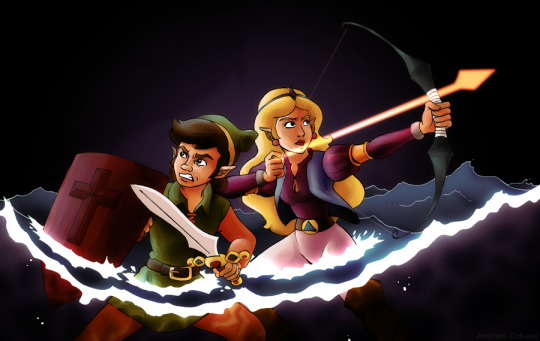
Nothing at all wrong with that in my opinion. You like something, you have the ability to create fan content for it, go for it.
But as we more or less already established via the Howard and Nester comic, Dobson was as a person dead set that only the thing he liked or was first exposed to counts and not whatever others thought. Something that supposedly may explain why he genuine hates Bowser Jr and Yoshi, as evident by these tweets made a few years after the Localization comic was made.
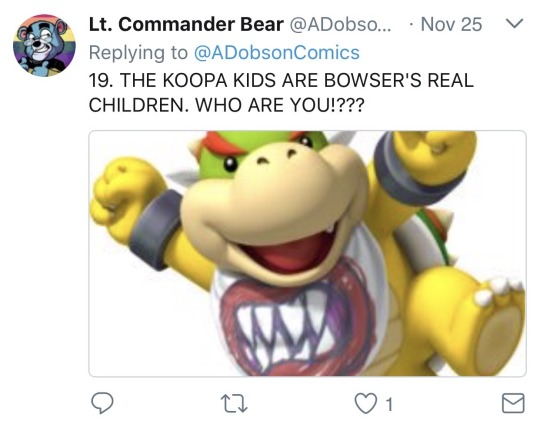
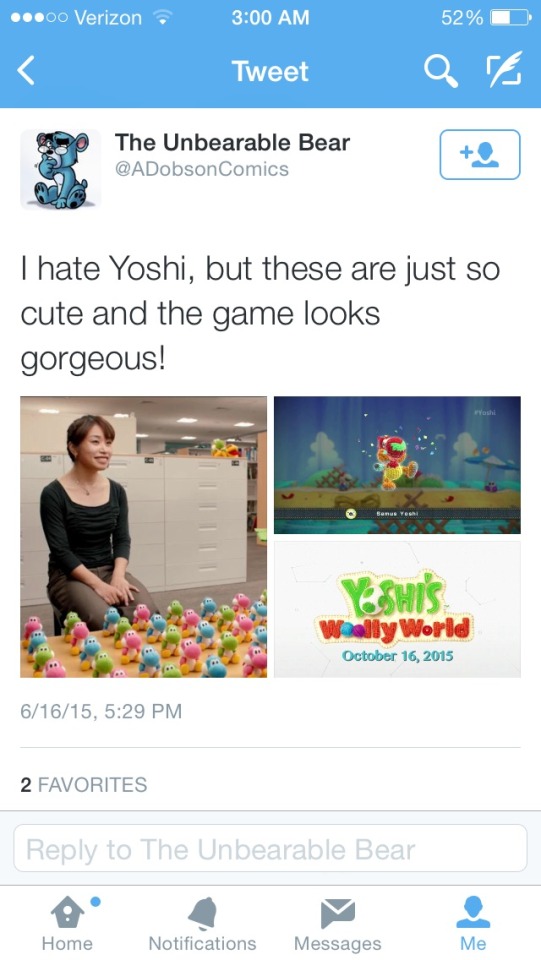
And yeah sorry, but how can one hate Yoshi? Yoshi is an adorable pet dinosaur you can ride. You know how many kids would have loved someone like that in their life? Gues if Yoshi was less into vore and more into inflation, Dobson would have liked him more.
Speaking of the comic -and to finally get back to it- even Dobson admitted years later that the entire point of it is to simply piss all over Nintendo and that he was annoyed that his “beloved” American continuity got erased in favor of the “dirty Japanese” one. Despite the fact that the Japanese one is, as he himself admits, official.
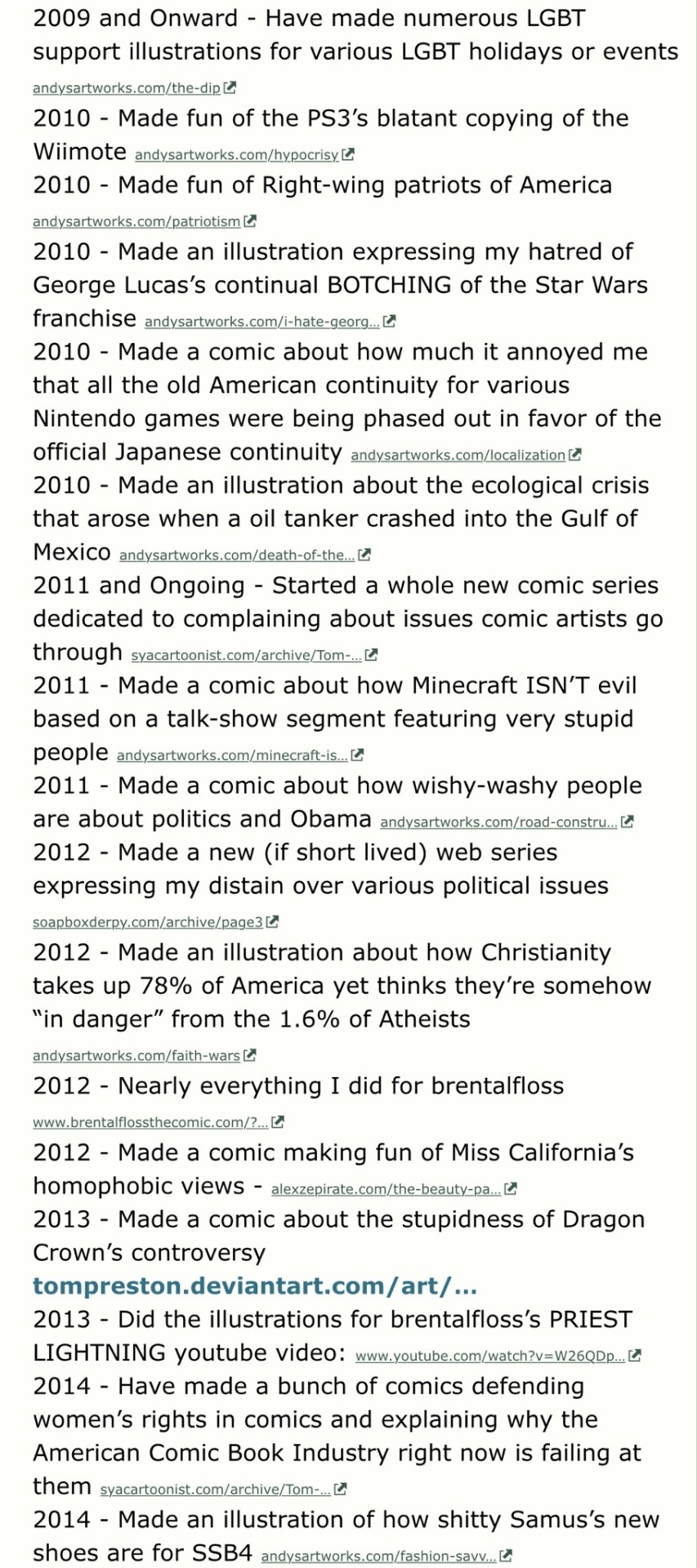
And boy does he take the piss on it. To the point I want to call him R. Kelly.
So lets dissect how his stand is just the typicla strawman affair, unfunny and at times quite frankly outright homophobic, sexist, hypocritical and racist.

First, the art. As always, it is just “great” to see the degree in animation being fully utilized here. No background but skyblue, everyone looking more like a doodle, the use of the fillbucket, the director having 5 fingers on his hand in the second panel, but four in the fifth, getting the numbers of fingers on Mario completely wrong, missing out on Peach in the last panel and so on… brilliant! How come Disney would not hire someone who could draw like that! Oh right, because standards. Though those have gotten quite low over the years
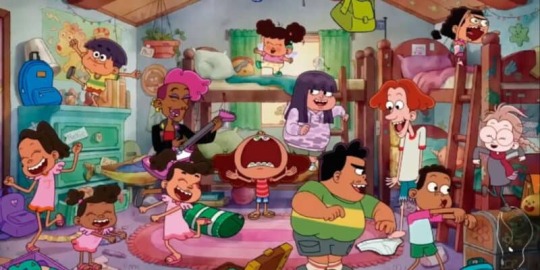
Every single person working on this needs to be blacklisted.
But of course, the true brilliance comes through the writing. Starting with the strawman executive coming off as if what he does is something new. That he is the “evil soulless corporation” who doesn’t care for his employees and creations true personality and forces them to fit into some mold for the audience to enjoy. The “audience” and consumers also being more or less indirectly insulted by the way Dobson presents the entire affair, as he seemingly wants to blame “those damn kids” for ruining his favorite childhood characters.
But Dobson, I thought you loved corporations hating on fans.
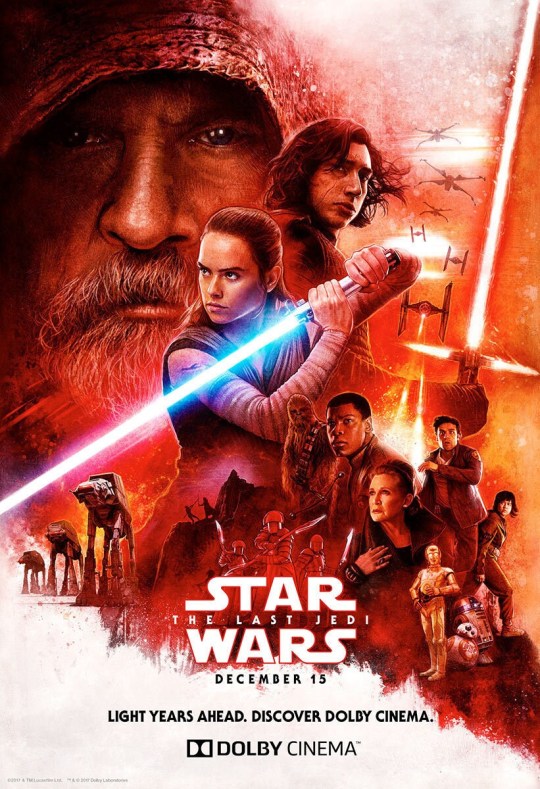
Then we come to what the characters are supposedly changed into.
(warning, upload of the comic for the third time, so you cna always see what I refer to)

First, Mario being no longer from Brooklyn and that he is supposedly an Italian stereotype. As a non American, I have to ask: Why is it so important that Mario has to be from Brooklyn? I get the feeling the only reason people like Dobson or Moviebob care about it, is because they want to deep down culturally appropriate the character. Assure he is in some way of American culture and doesn’t belong to some “dirty, foreign country”, even if they have to go for a compromise and make him a dirty half blood Wop. I mean, I will say this: Yes, Mario has an accent that is stereotypical. And? I take a stereotypical accent and being otherwise a determined but friendly everyday hero over him being stereotypically obsessed with pasta and no personality conveyed through his actions aside of being a bit mean and bossy to his brother, as was the case in that dang cartoon.
The thing here is, Dobson was genuinely convinced that Mario’s portrayal as given by Charles Martinet, Mario’s VA from the early 90s up until August of 2023, wasn’t just stereotypical, but also racist, harmful and culturally insensitive. Something he believed even back in 2017 and resulted in a minor twitter meltdown
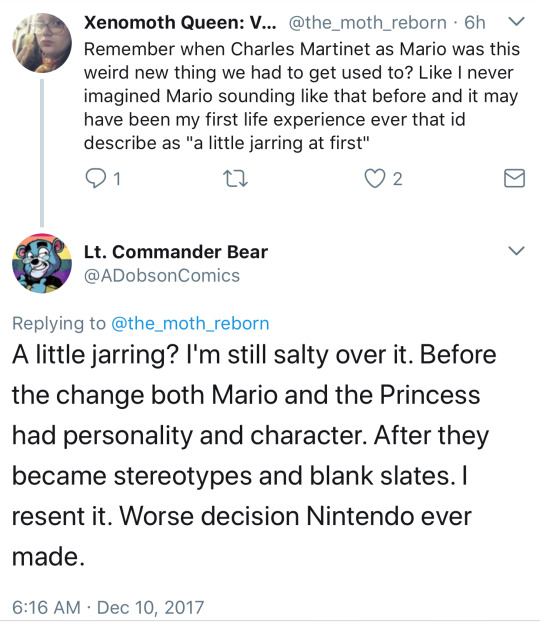
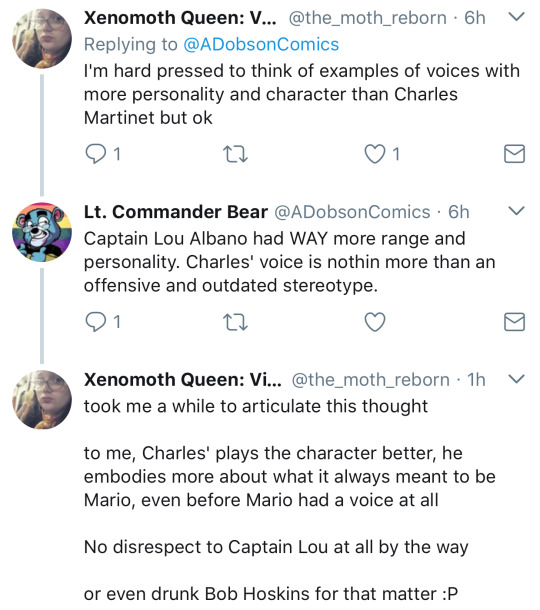

Look, I will say this here: Yes, Martinet’s voice for Mario is kinda stereotypical. And I did my research. Unlike Martinet, Lou Albano, the original voice of Mario in the Mario Bros Super Show, was actually of Italian heritage. Born in 1933 in Rome, having immigrated to the USA shortly after he got baptized in the Vatican (you can’t get more Italian than that!), he certainly was more authentically Italian than Martinet, who was born in California. Heck, Martinet’s father is actually French and he spend more time in France in his youth than in America or Italy. The story of how Martinet got his gig as Mario is also well known and painted by a rather stereotypical joke involving Italian food.
But to paraphrase the twitter user Dobson argued with, I think that all things considered, Martinet gave Mario and all the other characters he voiced over the years just a certain warmth and fun to their personality with the way he delivered his lines, that he managed to convey and define the cartoonish true nature of Mario and Co for many generations to come. And even now that he has been retired from the role, he is still a name recognized for the character. A character no one, not even freaking nationalistic Italians, seem to have a problem with. So, mangia un cazzo, Dobson. You sound just like the assholes who tried to get rid of Speedy Gonzales and in doing so pissed off all of Mexico.
Next the way he talks about Peach. Okay first, the Popeye arms are again just something from the cartoons. Or at least he believes it cause…. Well
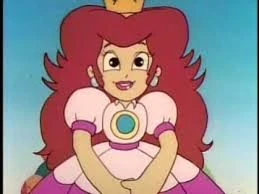
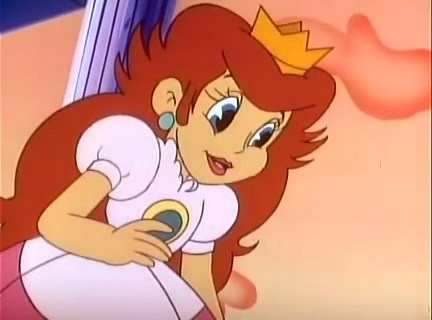
Does that look like Popeye arms?
Second, he is essentially saying that Princess Peach, unlike the cartoon version, is a bimbo. Why, because she is blonde and you have some sort of deep seated hatred for blond people? Also, Peach hasn’t fought with Mario together in really any NES videogame either, Dobson. Oh what, Mario Bros 2? Aka the reskinned version of Doki Doki Panic? The way he talks here about Princess Peach is just utterly sexist, as he essentially devalues Peach as a character, just because she plays a damsel in distress often times. Which doesn’t even necessarily mean, that she isn’t a badass in her own way, even in that role. I mean, she is still the sovereign ruler of an entire nation and in Super Princess Peach -which seems to be the game he references when it comes to her being “over emotionally”- she saves the day all on her own. Sure, she is emotional in the game, but the entire premise of the game is centered around everyone’s emotions going haywire along Vibe Island, including the villains. Bet Dobson hasn’t even played the game back in 2006 and just went off on some shitty rumor. Not to forget that this statement is utterly false. Peach has also been a great supporting character and fighter in games such as Super Mario RPG and Super Paper Mario, which were released BEFORE that comic. And nowadays she is also known as a great character in stuff like the Mario + Rabbids games plus she will get her own upcoming Princess Peach: Showtime game for the Switch. Lastly, let us not forget every game where, even if she played a damsel, was still important to the plot by defying the villain as best as she could. Not to forget the current movie, in which she still kicked ass while going out all in pink.
youtube
So, after he has been racist towards Italians indirectly as well as sexist towards women embracing their brand feminity (boy, don’t want to know how 2011 Dobson would have then reacted to the Barbie movie of 2023), let Dobson be judgmental about anime fangirls and also rather homophobic, by the way how he tries to tear down “modern” Link.
There are four things I hate the most about the Link panel, which make it frankly in my eyes the one where Dobson’s hatred and own nastiness really shine through.
First, the accusation that the “changes” to Link’s design past “Link’s Awakening” can be attributed to anime fangirls. Showing both his true hatred for women when they don’t fall in line with his views and his stuck up shitty opinion about anime fans and combining it with latent misogyny. Look, I have seen thirst anime fangirls myself a lot over my lifetime. But they were not the demographic to “ruin” Link. If anything, I think that the popularity of Cloud Strife in general with others may have slightly influenced Link’s design for Ocarina of Time. Which in itself also had been in development at least since spring of 1996, till its release in November of 1998. And even then, that is a stretch I came up with, cause in my opinion someone in the development team likely just thought “Hey, what if we move on from the more cartoony look of the late 80s and early 90s and try some “darker” fantasy elements, without going full Berserk?” And that is how we got Link in that game. Because of some developers trying to appeal design wise to a general audience, not just a random group of made up strawmen. You want to see games pandering to actual Yaoi fangirls aesthetically? Play Enzai or Twisted Wonderland.
Second, again his hatred towards blond people. I really would like to know where that comes from, because I doubt it was only related to some random bully in school being blond.
Third, the way he uses the word effeminate and describes post Ocarina of Time Link essentially as “nonthreatening”.
For starters, considering Link rams his sword into Ganon’s skull in Ocarina of Time and slashes away at many of his enemies, which is way more threatening and violent than just poking them with a stick in 2D overhead view, I wouldn’t really consider him “non threatening”. I like to call him and many of his future incarnations, badass as fuck. Even the cartoonish, childlike Link from the Wind Waker continuity, who didn’t just stab Ganon in the head, but put his sword in there for good. It also is kinda laughable how Dobson uses the word “non threatening” in a negative manner, seeing how over the years ever since he sucked off Steven Universe, he would whine on twitter and other social plattforms again and again how males in media are always resolving conflict only via violence and are not in tune with their emotions. In other words, he once considered being more or less pacifistic a negative trait.
Also, “effeminate”? Okay first, Link looks like this in Ocarina of Time…
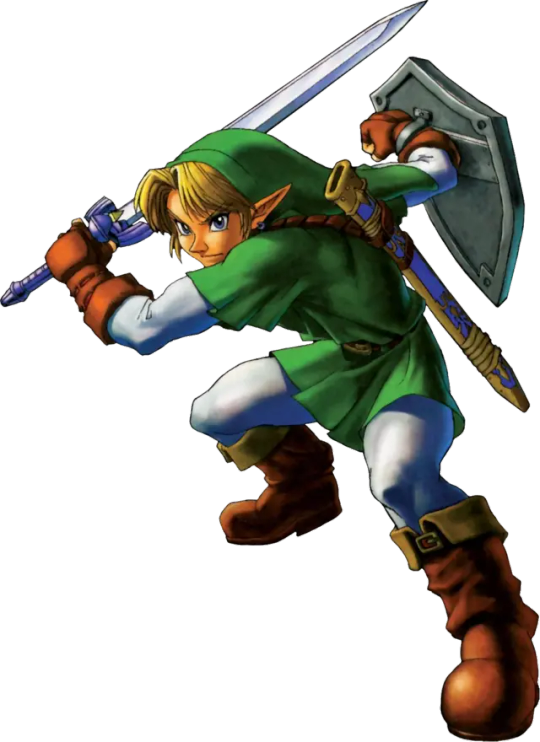
What exactly looks “effeminate” about male Link here, or at least let’s say more “effeminate” than for example in a character like this?
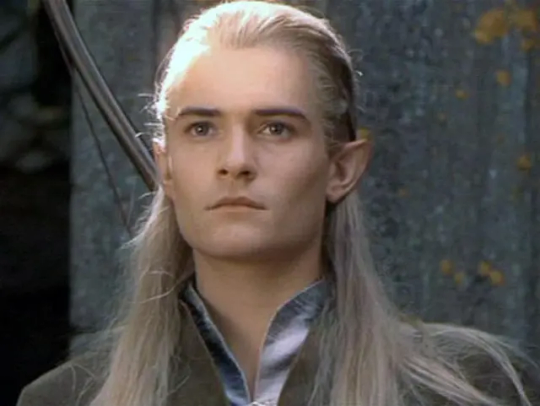
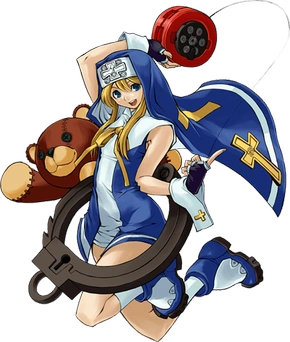
Second, we all know that if Link all off sudden looked more like Guts from Berserk or the protagonist of DarkSoul (you know, more “manly”), Dobson would throw enough of a hissy fit, he would likely come back from his sabbath and whine how Nintendo is embracing toxic masculine traits in his characters. All while also blaming PS3 games for some reason for that.

Third, how exactly would Dobson define effeminate here? I mean, the term is already defined as being derogatory, the most common definition I found by Merriam-Webter online being as followed
Effeminate: having feminine qualities untypical of a man : not manly in appearance or manner
Effeminate: marked by an unbecoming delicacy or overrefinement
So, Andrew “I hate all men” Dobson, has a problem with a character not being “typical” or stereotypical manly male? The same guy who praised the She-Ra reboot for its portrayal of Bow and fucking worships that fat fuck below as one of the best protagonists in a cartoon of the last decade…
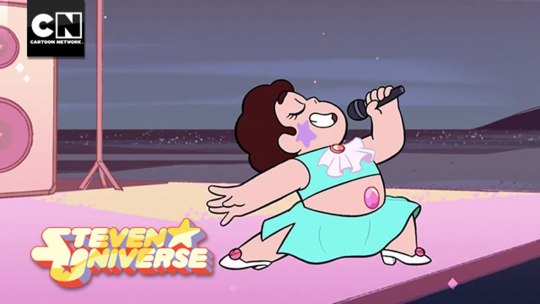
Has actually deep down a problem with people embracing more female interests, qualities or just looking more feminine in appearance, even though the later may not be by choice but rather genetics? All while also having the audacity to say then this years later?
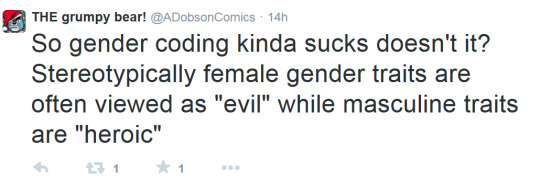
I find this just genuinely hate- and hurtful. Not just a simple complaint about a design choice regarding his supposed favorite fantasy game hero, but a “deep cut” towards people who just enjoy things not considered “stereotypically manly” or may feel not comfortable falling in line with gender expectations. I mean, what? Is a man now supposedly not manly in Dobson’s eyes because they like musicals, sweets are capable of showing empathy and other emotions or like to dress up in certain ways or take care of their appearance?
It is just disgusting to me, because I know people, both male and female, who had to deal with bullying and name calling a lot simple because they didn’t quite fall in line with expectations by others or struggle with their own identity partly because of expectations vs reality. And as evident by THIS comment TheHypocrisyofAndrewDobson received once it isn’t just “a joke” to people genuinely affected by that sort of mentality. And again, this derogatory use of the world and complaint towards “modern” Link comes from someone who years later would whine about toxic masculinity, put women on pedestals even if they are abusive, likely jerked it off to Link in Gerudo gear following Breath of the Wild and in the biggest ironic “twist”, loves the cartoon incarnation of Link, whose catchphrase is “Excuse me, Princess” and needs a restraining order as much as Warner Bros gave Pepe lePew.
And to finish this panel off (yes, we are still not at Samus), of course the next complain is how Zelda and Link are “no longer love interests” … now I apologize in advance towards any moderate shipper out here, but I am going full snarker mode now for this part. Okay?
Dobson… the fact that you cared so much about shipping two fictional characters in a series of children games, for a console primarily played by kids, while you were being in your 20s and above is pathetic as shit. I know that you have no one in life who genuinely loves you, because among other things you are incapable of either feeling or identifying true love while also being a selfish little shit, but to be so thirsty for affection that you project that need on some pieces of data or lines of color, makes you a bigger loser in my book than any republican who lost the primary against Donald Trump in 2015. The fact that you look at a piece of fiction and your immediate thought is “oohh, these two characters together would look very cute hugging, kissing and doing things I touch myself to at night”, while things such as plot progression and character development likely play second, third or fourth fiddle, only confirms to me that shippers (at least the once acting like you in that regard and other fields) are a fucking blight on any fandom and the world at large.
Now with that shit vented, I once again apologize for going that far, even for “comedic purpose” towards the people who actually can recognize when they go just a bit too far with shipping. But this isn’t just annoying in regard to this comic, it is annoying with Dobson in general. If you are even remotely aware of how he treats the LGBT subject for real as well as what he truly enjoys about Legend of Korra and Miraculous Ladybug, you know he is thirstier than someone stranded in the Gobi desert. Just look at his pic of Zelda and Linkle he made in honour of Hyrule Warriors.
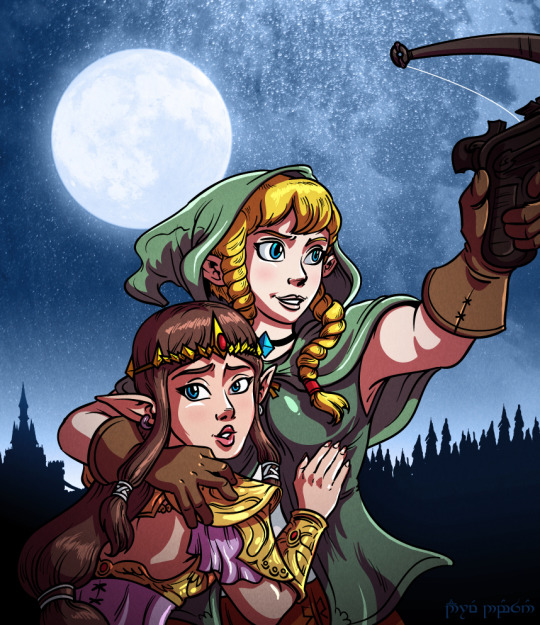
I can kinda taste his urge to touch himself there.
To me it is just dumb to define any story out there and the characters in it by simply “are they getting together or not” because romance to me in storytelling is an additional flavor, not the main ingredient. It is one reason I really do not like Miraculous Ladybug for example. And the fact that Dobson seems to define Legend of Zelda a lot as a franchise by the “shipping potential” of Link and Zelda as implied by that panel, irks me in all the wrong ways.
I mean, for the most part the appeal of the Zelda games isn’t the “romance” between the two, it is traversing the land of Hyrule and saving it from evil while going on a big adventure. And let us be real here, Link and Zelda weren’t really an item pre-Ocarina of Time either. In the NES and SNES games they were essentially strangers to each other, with one filling the role of damsel in distress even a bit harder than Peach did. After all, Peach may be a princess, but she actually rules her kingdom. Zelda on the other hand is daddy’s little girl in those and other games post 1998. And the relationship they had in the cartoon, the one Dobson likes to call a “may they, won’t they” thing is in my opinion not cute, but toxic. She is a demanding bitch that calls him names at times, he is a horndog who needs a lecture by Sexual Harassment Panda and none of them improves character wise over the show.
youtube
What a misogynistic piece of shit
There is a reason I consider Tetra, Zelda from Skyward Sword and the “Wild” Zelda the better interests, because not only do Link and Zelda here have better chemistry and are both nicer and more respectful to each other in a manner, they also support each other in very heroic ways. I mean, Zelda in Tears of the Kingdom willingly sacrificed her own conscious just so Link can have a shot at defeating Ganon and saving Hyrule in the future, while Link wants to do everything to save his friend. If that isn’t impactful, tragic and has so much romantic potential, I don’t know what else would count.
But hey, supposedly the cartoon is better. And the 365 Days Trilogy is a great love story with no unfortunate implications involving sexual relationships and abuse. *snark*
And then it is Samus turn. And I really have to wonder, if Dobson ever even played a Metroid Game before Other M anyway, as he hates games with scary elements and FPS.
Aside of once again whining about changing the hair color (Dobson seems to be something of a reverse Aryan enthusiast), he acts as if the addition of the Zero Suit in Metroid was a cardinal sin and “sexist crap”, to entice more men to playing her game.
Okay… for starters, the Metroid games were already enjoyed by a huge male demographic long before that or before even Metroid Prime. Samus wasn’t a “played by females thirsty for representation” only character, as that comic seems to imply. She was considered a female badass hero from the moment she first appeared and her design is deliberately inspired by Ripley from Alien. And skimpy? Again, Dobson doesn’t seem to know what certain words mean. Skimpy would be when the outfit would show more off her skin or was barely there. This is a skintight jumpsuit, that also has a function in the game as a less movement restricting suit compared to Samus armor. Heck, just watch this video, that guy gives some decent explanation on the suit itself.
youtube
And yeah, I can agree that in certain cutscenes more so than the actual game, it does put quite a bit of emphasize on Samus “attributes” so to speak. But are we really trying to insinuate that the Zero Jumpsuit is more sexist than the character stripping off to her underwear as was the bonus ending content of the initial Metroid games?
youtube
And if the issue is that the skinsuit makes Samus more “sexy” and that Dobson does not want to see sexy characters in Nintendo games…
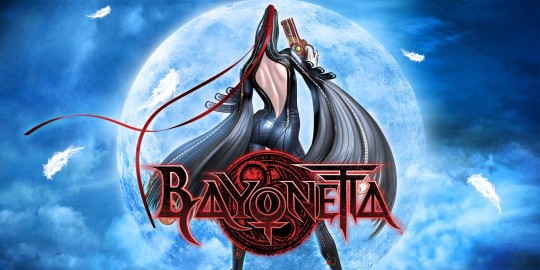
He should reevaluate the fact that he enjoyed the above later.
There is also this little tweet I found after the fact, Dosbon would make later in 2015, where he actually more or less confirms the idea, that he thinks the Japanese only care for Samus in a “sexy skintight” manner, by making this dumbass “joke” comparison
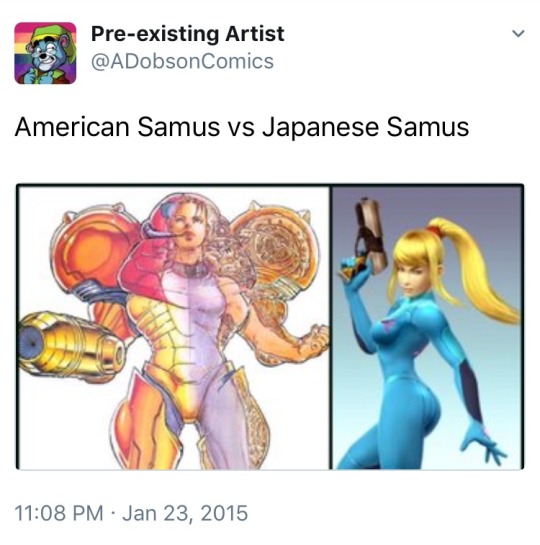
Ignoring the fact btw, that the pic on the left was drawn by Samus original designer Hiroji Kiyotake. Again, Dobson trying to discredit the Japanese. And don't get me even started that he enjoys Other M or takes more offense to the shoedesign of Samus in Smash Bros than anything
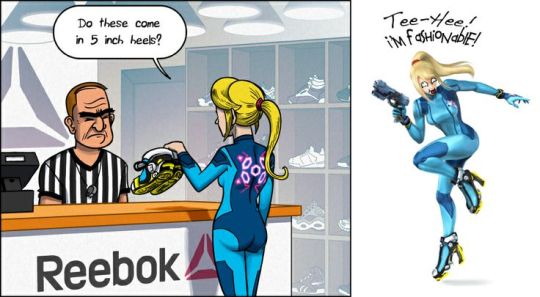
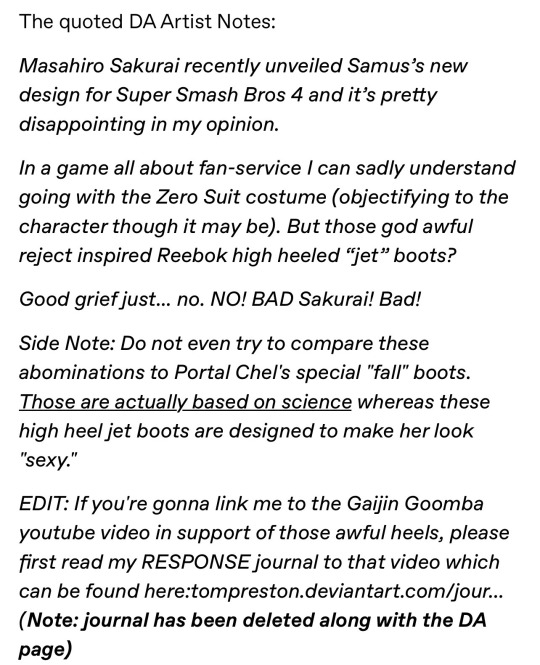
Finally, and to wrap this thing up, we reach the final panel, showing the executive declaring that the “old” stuff shall from now on be brushed off like Dobson tried to brush off his fetish artist days, all while the “new and improved, but truly despicable” pretenders of his favorite childhood heroes are behind him. Mario lobotomized to say MAMA MIA while his eyes look like he is possessed by the retardation of Talus, Link being a “silly girl who makes silly movements with her hands and likely just wants to hang out with cute boys”, while Samus looks pissed and just wishes she was in something less degrading for her than this comic. Like Other M.
Honestly, this comic just stinks of loser entitlement and as stated prior, toxic nostalgia. Dobson has never really been a creator of decent stuff, only a consumer who demands the next product as soon as he hungers for it and will be utterly judgemental to petty and spiteful degrees, when he doesn’t get what he wants or suddenly thinks he sees something “problematic” to it. And to him, already the fact that stylistic choices and aesthetics changed over time, a natural progression of things if you ask me, is “problematic” in his eyes. Dobson would have rather had for Zelda, Link, Mario, Samus and Co to be undefined postholders he could have projected himself on, or outdated 80s stereotypes and toxic men, because that is the first thing he was ever exposed to when it came to those characters. Why not go even further, Dobson? Erase the Switch, the Wii and any other game console post 1989 from history, so that gaming itself never evolves past the 8-Bit era. Let’s destroy Pokemon, God of War, Kirby, Sonic and many other franchises and characters, because they are not the “true heroes of the Golden Age of gaming”. Let’s see how you will like that, when they come for your beloved Skyrim.
Bottom line, Dobson is a nostalgic pig, stuck in a past he looks at through rose tainted, grease covered glasses and this comic more than anything written before and after that embodies the mentality quite as well. And even though he tried to play it off as a joke, anyone with half a brain saw through what it was really about. And they made Dobson know, partly through less words than I used here, why they thought his opinion and by extension he, sucked.
Dobson wasn’t just playing the overzealous Nintendo fan for shit and giggles. He was, this overzealous, almost destructive and utterly disrespectful fan, who believed in the superiority of his favorite childhood toy over the consoles of others, even if that included pissing off his own “kin” or accussing Nintendo of being problematic dirty foreigners. Just look at anything he would type in regard of Super Smash Bros for the Switch, like how pissed he was at the fact he had to put effort into getting his favorite character to play as. Essentially insinuating, the game and people enjoying it were crap, just because he was biased towards fighting games to begin with. And look, being critical of aspects of a game, is one thing. But some of the things Dobson found to complain about? Pathetic, childish and utterly irrelevant in the bigger picture of anything
youtube
I want to punch him in the throat for this voice alone...
And if you think Dobson being an opinionated Nintendo fanboy is cringe, wait till we get to him being an opinionated PS3 hater.
But before that, I want to tear at least one of his shitty Zelda opinions a new one…
#andrew dobson#syac#so you are a cartoonist#tom preston#adobsonartwork#webcomic#youtube#adobsoncomic#nintendo#super mario#legend of zelda#link#samus aran#metroid#nintendo vember#Youtube
49 notes
·
View notes
Note
🔥 Tim Burton (him as a person or his aesthetic, your choice!)
"Beetlejuice" (1988) reminds me a lot of another film I watched recently; "Tombstone" (1993). Sold by an aesthetic and a FANTASTIC performance from a side character, audiences were conned into loving a mediocre film. I'm not Lindsey Ellis, so don't expect me to talk about the cartoon.
"Batman" (1989) and its sequel is proof that Burton will not be giving up his aesthetic for God or money. Gotham is heavily disconnected from both the film and its source material, with little reason other than its director. There's a reason no one calls these "Keaton's Batmans," they call them "Burton's Batmans." Jack Nicholson is great as The Joker, but that's no hot take. The hot take is that Devito is too horny as The Penguin, and it makes me uncomfortable for a film that's already so sexual.
"Edward Scissorhands" (1990) is a bitter, bitter film where artist finally meets muse. Not, like, in the plot, but in the production. Depp and Burton were made for eachother... or at least that's what I'm supposed to think. This movie's just too messy, however, and can't decide where its focal point lies and leaves me wishing I had just watched "How the Grinch Stole Christmas" (2000) instead.
"Sleepy Hollow" (1999) leaves me, a fan of the original text, I know that's probably a weird thing to say, miffed, even if understanding. Outside of some pacing issues, it's a bold reimagining that feels like Burton attempting to get out of his comfort zone... but I just didn't need this story to be turned into an homage to B-horror. Go watch that Disney short, eh?
"Big Fish" (2003) is his best film. I am hardly qualified to speak on it, and even if I did, I would cry. So, you know, just go watch that shit.
"Charlie and the Chocolate Factory" (2005) is destined to be compared to "Willy Wonka & the Chocolate Factory" (1971), and why wouldn't it? In thirty-four years since the making of the original, not a single person worth listening to said "i need this done right," including Burton himself, which is why he tries to add so much, but no amount of additions changes the fact that he casted his muse instead of someone who could, you know, act like Wonka? So, you know, destined for failure and to be loved by everyone who won't watch movies made before 1987.
"Corpse Bride" (2005) is one of only two claymation films that Burton would actually direct, and he uses this time to steal a Jewish story and make it less Jewish. I don't like the ending or the songs and it feels like it could be cut in half and achieve the same effect.
"Sweeney Todd: The Demon Barber of Fleet Street" (2007) literally doesn't have the iconic opening number from the stage play??? Overall, there's rarely a pairing of source material and director that works as well as this one... If only I enjoyed the source material, eh? So dark, so bitter, so edgy, so... nothing. I never think about this movie. When I do, I think of Mrs. Lovett's dream sequence and remember the good old days of "Big Fish" (2003) when Burton liked to use color.
"Alice in Wonderland" (2010) is one of my guiltiest pleasures in all of film. It is the reason why every time Disney announces a live-action remake, my ears perk up. If all of them were as wild, unhinged, original, creative, and inspired as this one... Well, I think Disney might not be fucking bleeding money right now. No one ever even mentions that it's a sequel to the original animated film. A SEQUEL, not a remake. Sometime movie-goers surprise me with how little they think.
"Frankenweenie" (2012) blows. I don't care how unique it is, I do not like it.
"Miss Peregrine's Home for Peculiar Children" (2016) is one of the funniest remnants of the teen dystopia genre. Like, it hardly applies, but is trying SO HARD that it's unbelievable. Also, props to Mr. "Black People Aren't My Aesthetic" for casting Samuel L. Jackson as a dude who eats white babies. (I do not mean that.) Seriously, this is proof that Burton, as a modern director, should no longer be taken seriously.
"Dumbo" (2019) is AAHAHAHAHAHAHAAAAAHAHAAAAHAHAHAHA I FUCKING HATE THIS DUDE HOLY SHIT
If I didn't mention, I haven't seen it. Yes, I know I skipped some big ones. I may watch them one day, but I am in no rush.
21 notes
·
View notes
Text
Raw feeder: Dogs are carnivores because they share 99% of their genes with grey wolves. Me: That's not true. Dogs were fed porridge. Only the aristocrats could afford to give their dog a meat-rich or fat-rich diet. You can check farming magazines for recipes for grain-heavy dog porridge. The only time you find meat-rich or fat-rich diet are in hunting magazines for the upper class. Raw feeder conspiracy theorist: The idea that meat was hard to get had been a political message sine the 1950s based on a study that only track meat sales that crossed state lines.
Holy fuck. So, everyone I know with families passing down memories of the famine years during 18th, 19th and early 20th century as well the post-WW2 economic recessions during are lying
Like, half of my friends remember dreading pea-soup thursdays during the 1980s and the 1990s before that was finally dropped in 2000s and 2010s. And most of them come from families who still tell tales about the hunger years of 1860s and 1910s to 1930s. Like literal stories and recipes about making bread from pine bark flour [archived]. Just say you hate the working class.
2 notes
·
View notes
Text
By: Aaron Earls
Published: Oct 22, 2023
The next generation is often leaving the faith while under the supervision of parents who believe they’re passing on their religious values.
When church leaders imagine young people turning away from Christianity, they may picture a college student being convinced by an atheist professor or an older high schooler getting a driver’s license and using their newfound freedom to leave church behind. In reality, the secularization of the next generation may look more like a 14-year-old watching YouTube in their room.
New analysis published at the Institute for Family Studies (IFS) reveals children born in the 1980s and ’90s never absorbed the faith in their home. And they walked away from it at an earlier age than most parents and leaders suspect.
In the early 1990s, no more than 16% of 8th, 10th, and 12th graders said religion was not important to them at all, according to the Monitoring the Future survey series. By the early 2000s, however, the percentage of high school seniors who completely dismissed the importance of religion to them personally began to increase dramatically.
For close to a decade, sophomores were more like 8th graders, with both hovering around 15%. But around 2010, 10th graders became more like 12th graders in terms of their disregard for religion. A few years later, the percentage of 8th graders who said religion is not at all important began to rapidly increase.
In the latest study, close to 30% of seniors and sophomores and almost 25% of 8th graders said they didn’t consider religion to have any importance.
When does secularization happen?
One explanation for this could be fewer parents saying religion is important to them. More secular parents may be passing on their lack of faith to their children. But the IFS analysis also looked at a 2019 Pew Research study that asked both children and parents about the importance of religion.
At age 13, there is little difference between the percentage of teenagers who self-report that religion is not at all important and the percentage of parents who say religion is not important to their child. A gap emerges at 14. This gap is sizeable by 15 when more than 20% of teenagers say religion is not at all important.
There’s no real increase in secularization among teenagers after they reach 15. The shift away from religion occurs before then. Meanwhile, parents’ perception stays flat across the age range at around 10-15% who say religion is unimportant for their child.
Additionally, the National Longitudinal Survey of Youth (NLSY) followed the religious affiliation of those born between 1980-86 until around age 30. “Of NLSY respondents surveyed at age 13, around 12% were nonreligious. By age 17, 17% were nonreligious,” reported research fellow Lyman Stone in the IFS report.
“Religious affiliation wasn’t surveyed for a few young adult years, but then by age 21, about 21-23% of these young people were nonreligious, a share that has been essentially unchanged until today. In other words, this cohorts’ rise in secularism occurred by age 21, and much of it by age 17.” Yet, only 7% of parents report raising their children with no religion between the ages of 13-17.
Stone concludes that “most nonreligious children are born into religious households and lose their faith while under the supervision of parents who believe that they are successfully transmitting their religious values.”
Sweet 16
Similarly, the most recent Lifeway Research study of teenage church dropouts found 66% of those who attended a U.S. Protestant church regularly for at least a year also stopped attending for at least a year as a young adult. Similarly to the IFS analysis, teenagers often begin their religious separation prior to their college years.
Sixteen is often a pivotal age for those dropping out of church. At that age, the attendance rates start to diverge for those who stay in church as adults and those who drop out. The next few years become the church dropout danger zone when most teenagers leave behind regular church involvement.
[ Continues to strategies for retention... ]
#Aaron Earls#religion#leaving religion#rise of the nones#empty the pews#no religion#irreligion#christianity#the good news#good news#religion is a mental illness
14 notes
·
View notes
Text
Long article but worth the read.
Some things make less sense the more you study them: the SNP’s finances, Joe Biden’s sentences… and being nonbinary.
Nonbinary is an umbrella term used to describe those people who believe they are outside the gender binary. They believe that they are neither male nor female.
When you ask nonbinaries what they mean by this, the response usually boils down to men saying they feel kinda feminine sometimes, and women saying they kinda don’t. It’s not exactly The Communist Manifesto. When you point out that some men and women have felt this way since time immemorial, without feeling the need to turn it into a political cause, nonbinary males become aggressive and nonbinary females become sulky. All of which suggests that this nonbinary LARP may require some more thought.
If, like me, you prefer to identify as non-lunatic, you might be tempted to dismiss the nonbinary phenomenon as a passing fad, like the Tamagotchi ‘egg’ toys popular among children a couple of decades ago. But there’s a difference between the idea of nonbinary and fads like Tamagotchis, especially among the young. Schools banned Tamagotchis in the 1990s because they were a distraction. This time, our public institutions, from multinational corporations to medical bodies, are actively promoting the idea that you can be neither male nor female.
Advocates themselves seem unclear as to what ‘nonbinary’ means. Some seem unsure where to draw the line between being nonbinary and being trans. The huge American LGBTQ+ charity, the Trevor Project, insists that ‘It’s important to note that not all nonbinary folks identify as trans’. But the UK’s LGBT Foundation argues that nonbinary fits under the so-called trans umbrella. This isn’t much help, however, since the trans umbrella has by now grown so huge it could be used to protect the polar ice caps.
Throughout much of the 20th century, the prefix ‘trans’ tended to be used in relation to transvestites or transsexuals. It implied a transition from one gender or sex to the other. But this started to change in the 1990s. Disappointed by the physical results of transitioning – think big-jawed, deep-voiced ‘transwomen’ and miniature, small-boned ‘transmen’ – the trans lobby started to look for a new vocabulary that might capture what it is to be neither male nor female.
Activist Riki Wilchins played a key role in the development of nonbinary. He originally came to prominence in 1991, when he co-founded Camp Trans, an annual protest against the exclusion of transwomen from the women-only Michigan Womyn’s Music Festival. In the mid-1990s, he sowed the seeds for the idea of being nonbinary by coining a new term to describe himself – namely, ‘genderqueer’.
It was a fortuitous moment for Wilchins. From the late 1990s onwards, with queer theory flourishing in universities in the UK and the US, a slew of new identities and neologisms were being turned out, from agender and bigender to demigender and genderfluid. Nonbinary started to be used by activists and academics to encompass these new identities in the 2000s. Indeed, in 2002, Wilchins co-authored the tellingly titled Genderqueer: Voices From Beyond the Sexual Binary.
It wasn’t really until the latter half of the 2010s that nonbinary moved from the spheres of academia and activism and into mainstream culture – largely because an army of idiot celebrities embraced it.
Singer Sam Smith was one such bandwagon-jumper. In 2019, he declared himself to be ‘nonbinary’ and embraced ‘they / them’ pronouns. Smith was once an attractive young gay man. In his new nonbinary guise, he has come to resemble someone forced to twerk in fishnets as a prank.
See rest of article
5 notes
·
View notes
Text
Breaking down the comics: BENDIS. PART 1.
READING THINGS SO YOU DON'T HAVE TO!
ALRIGHT EVERYONE IT'S TIME.
It's 12 issues long.
When this came out, I thought "This is the worst thing ever." and was so disappointed and angry. I refused to purchase the trade and frowned at it real hard any time it was mentioned.
If I could go back in time and tell little me that there were far...FAR...worse things ahead I'm not sure I'd have believed me.
Lucky for me, something spectacular and wondrous and amazing was also ahead.
But we'll get to that later.
Moon Knight: (2011)
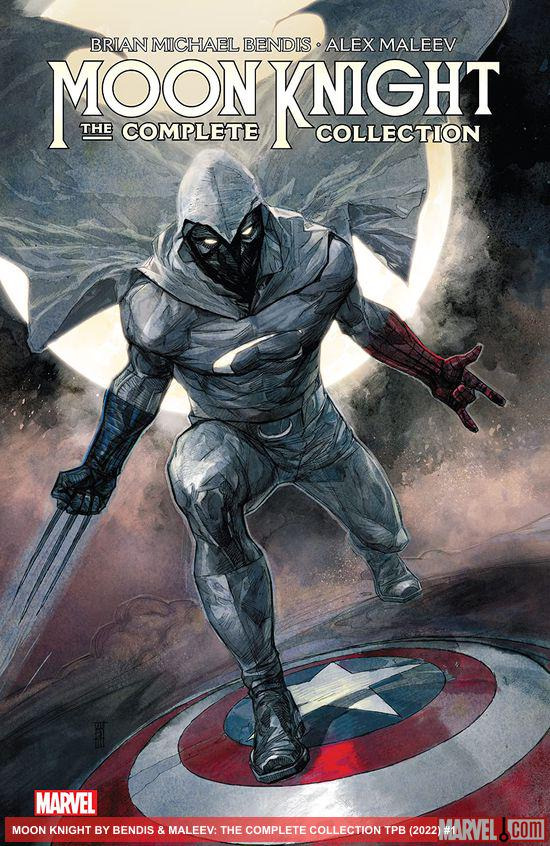
publication date: July 2011-June 2012.
Writer: Brian Michael Bendis
Artist: Alex Maleev
Editor: Jeff Youngquist
TIME LINE TIME!
Let's start off with a little bit of Comic History!
Moon Knight started in 1975. Moench and Zelenetz took it to 1990.
We hit the 90s and it was a rough go for our pal. I'll cover the 90s later.
Moon Knight then faded into obscurity and only the die hard fans that remembered our friend in white clung to every fleeting background appearance or mention.
He then returned to us in 2006.
The series of runs from 2006-2009 revived the series into a new glorious age of Marvel comics. The comics were far from perfect, the characterization was often WAY off, but it was better than nothing and a lot of good did come out of that age.
2009-2010 brought us Vengeance of Moon Knight, which was also pretty good.
Moon Knight was trucking along.
It was roughly in this age that I became aware of Moon Knight and started reading the old stuff.
Then 2011 they announced a new writer taking over Moon Knight.
I actually went to a convention and remember this announcement.
Marvel editor and Chief Joe Quesada was heading the panel and was super excited. He professed to love Moon Knight and was super enthused to see him not only be continued, but to also be in the hands of such an esteemed writer as Bendis AND joining a west coast team. (I'll get to that).
So from 2011-2012 we got...THIS....
Moon Knight was then swiftly canceled.
It was a disaster and did NOT do well on sales or reviews. (gee. Wonder why).
And in TRUE Marvel fashion, they quietly swept it under the rug. They claimed that interest in Moon Knight had died and they would not continue to write for a comic no one would read.
He had a few small background parts now and then, and fans continued to ask if they were going to bring him back.
It wasn't till 2014 under "Marvel Now" (a new age under Marvel) that he was brought back under Ellis.
Now, a LOT of people hate on Ellis. But they have to understand what Ellis had to work with. Where Ellis was coming from with Moon Knight, and WHY he had to do it so subtly like he did.
So let me show you WHY my appreciation for Ellis runs so deep.
You may have noticed something. I called Bendis an "esteemed writer".
So who is Brian Michael Bendis?
This is the man that is KNOWN for his work in the Avengers.
He was the man that relaunched the Avengers franchise in 2000. Marvel was NOT doing well in the late 90s. DC was on the rise and kicking ass.
I'm not saying this man saved Marvel comics... But he certainly brought the comic fans back in.
Secret War, House of M, Secret Invasion, Siege, Age of Ultron, Avengers Disassembled...
These are BIG name runs that he wrote storylines for and was in charge of. These are big name events!
You all know by now I hate events and tie-in cross-overs (There are two notable exceptions, but those are not Moon Knight related), but I have to appreciate them when they actually do make the comics thrive.
Also, it takes a LOT to keep these events organized. And it takes a good writer to write for large groups like the Avengers.
This man also created some very well known comic characters. Riri Williams, Jessica Jones, and...MILES MORALES.
THAT'S RIGHT. This man gave us MILES!
He's won five Eisner Awards.
He is GOOD at what he does. He's god at writing teams. He keeps the dialogue smooth and flowing. He keeps track of all the characters.
But... You'll notice something....
All those incredibly big name events and series? They are teams. They are groups. They are big hitters. They are mostly super powered and work well in teams.
This brings me to a very big point.
Just because you are good at one thing, does not make you good at all things.
And that's where Marvel messed up.
They happily put Moon Knight into the hands of someone who was used to writing for Captain America and Iron Man.
You all know by now, or you will soon, Moon Knight is a VERY different sort of hero.
He has no powers. He has no armor. He’s not super smart and he isn’t a leader. He's just a man. A man with severe trauma. A man with a past. Oh...And he's actually Three men in a white cape pretending to be one fully functioning normal guy and failing at it miserably. In fact, he’s been offered to lead teams MANY times and every time he turned it down. He doesn’t play well with others. Every time he meets up with another character, they start with a fight before they calm down and introduce themselves (one exception was Hilariously the Punisher who happily shook his hand and invited him into his chopper).
So I can’t be angry at Bendis. Bendis even admitted that he didn’t know who Moon Knight was when he was given the comic. He had to do some quick catching up.
The pressure was on, he didn’t understand the character, and there was a PUSH to introduce Moon Knight to the wider Marvel universe.
So I can’t 100% fault Bendis for the trash heap he gave us. He certainly isn’t Bemis, who is just an overall terrible person.
But I CAN fault him for not doing his research and not treating the major themes that tend to historically follow Moon Knight with respect. The biggest one being: Mental Health.
So if Aaron was a disaster of religious failure, Bemis was a disaster of hate crimes and racism, then Bendis is a disaster of the mind.
Without further rambling, let’s get into it!!
Issue #1 (same image as up top).
Title page as the standard blurb on who the character is.
"Left to die outside an Egyptian temple, mentally unstable mercenary Marc Spector believes himself to have been resurrected by the ancient deity Khonshu to be his supernatural avatar on Earth. When night falls, Spector dons the mantle of Khonshu and fights the darkness as Moon KNight."
Not a great start people. 'dons the mantle of Khonshu'. This is literally all Bendis knew about Moon Knight going in. If this is the only description you have to go on, you are not going to have a good time.
We open with a very Kirk Russel looking version of Marc Spector out in the desert with a dramatic retelling of his fight with Bushman.
What's interesting is that Bushman calls him "Lockley".

They have their shoot out, Marc is shot and Bushman leaves him saying "You were the best there ever was."
Doing his usual, Marc crawls through the desert to the Moon Temple.
He goes to the body of the dead Professor (Marlene's father) and wishes to make it up to him despite dying. He then goes to the Khonshu statue and begs before dying.
Marlene sobs over him, calling him "Jake".
The scene ends and it's to be continued.
Fade to black. Executive Producer Marc Spector.
Yeah... Marc went to Hollywood and made a show about Moon Knight.
You see, up to this point, no one realy knew what Steven was doing to make them money. In the 80s he gave to charities, set up entertainment things like Ballet and museums and things, and played the stocks a bit.
Later he became a producer.
Then, when the writers all decided they didn't want to write Steven anymore because he was 'boring' he turned into Marc and Marc headed the financial aspect of things and became the producer of the shows.
So here we see Marc making the show about himself and using the name Lockley so no one knows it's about him.
He...He's trying.
So the name of the show is "Legend of the Khonshu".
This is the pilot episode and they are at a launch party.
We see Marc hanging with a pretty blond that is NOT Marlene. At this point she’s left him.
"Is it true that you were a really for real mercenary?"
"Well, let's just say... I have learned I'm not the first person in the world to transition their career into Hollywood after a...Less than honorable start."
He gets a call and the person asks if he can go outside.

This is odd. And it should have been my first clue something was wrong.
But we'll get there.
We've got Captain America, Spider-man, and Wolverine asking for Moon Knight.
And while Moon Knight has been an Avenger off and on and off and on at this point, he also has never been well trusted or liked by the big guys like Cap and Iron man.
Cap tells him that "SHIELD's still tryig to gather formal intel, but there's been a rather substantial migration of criminal activity from the East coast to here. Right here in your new backyard. We need you to go to work."
(this was the reason for the West Coast Avengers, but that's a different run).
"Substatial Migration of criminal activity?"
"Maybe if you weren't so busy making crap TV--" Wolverine gets uppity.
"Have you seen the show, Wolverine? It's actually pretty good."
"Yeah, that's what I got time for, watching you sell your soul entirely."
"Good news, though, I'm getting paid a fortune for it."
Cap breaks up the banter and Marc asks for details.
Spider-Man explains that too many super heros lived on the east coast and too many villains were trying to be the kingpin of New York. So now they figure they can go to L.A.
"But now we have you here." "Me?" "You made L.A. your territory." "By living here?"
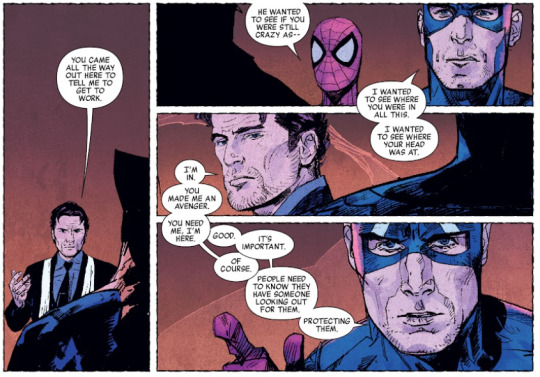
This has always been an issue. Ever since it became known that Moon Knight had mental issues, all the Avengers have always treated him like “the crazy one”. Especially since he’s the ONLY superhero that is publicly open about his mental health issues.
He’s even come out to the Avengers as having D.I.D and introduced Jake and Steven to them (see Spider-man encounters that was mostly used for LOLs). What’s interesting is seeing which heroes react in what ways.
I could do a whole breakdown on the response of each Avenger to those with mental health issues. From Captain America’s don’t ask don’t tell attitude that stems from being brought up in the 30s-40s to Punisher who takes it in stride and doesn’t care.
So they came all the way out to LA from NY to put him to work. Brings to mind the old meme: This could have been an email.
Cap reminds him that he's an Avender now and part of a team. "If things get to be too much...You send for us. Give the call. We're here for you. That's what being an Avender means. You're not alone."
Problems with that: 1. The Avengers are in NY. He's in LA. That's a few hours away even by Helicarrier. 2. To quote Sassy Steven Grant from MCU "Yeah that's sort of like the problem, innit?"
But ignore that. Look at this ART.

We head over to a warf where two criminal looking thugs are waiting by a van.
They're having some friendly banter about their job and their boss.
"Ask yourself this: This job you have--Who do you think had it before you? Where is that person now? Exactly how dead are they? And which one of the, I don't know, X-Men do you think maybe killed them?"
"I see your point. I just don't agree with it. I want to do the job we were hired to do and then I want to go home."
I do love some good hench men banter.
While they banter, Moon Knight sneaks around up top to watch as a ship comes in.
A very large man gets off the ship and demands to know which one of them has "Mr. Hyde's Money?"
They don't have money. They were just ordered to pick up what's on the boat. The man demands money for the thing on the boat.
He threatens to crush them to death, they threaten to shoot him.
The giant man lifts them up and smashes their heads together.
Alright, time for Moon Knight to swing into action. He first gets his attention with a crescent dart that cuts his cheek.
Just gonna put this right here….
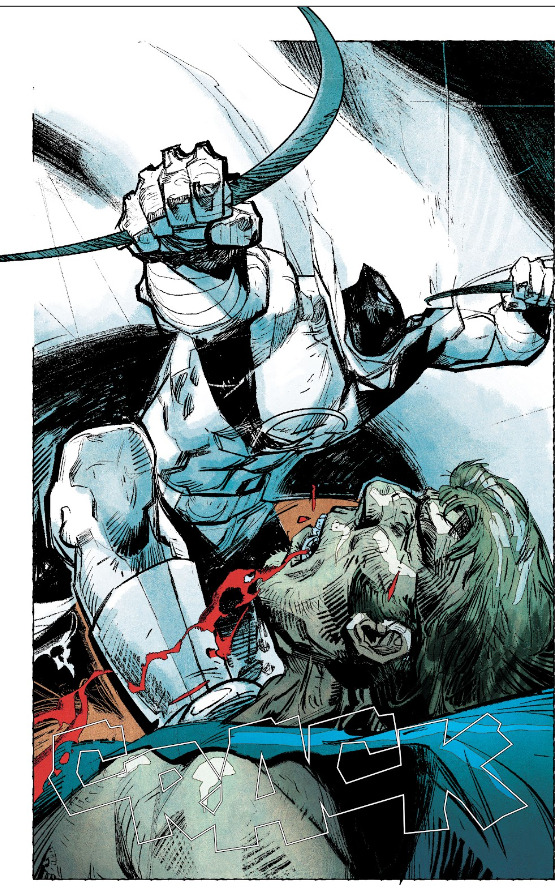
Our buddy Moony has fought many giant strong men before. He's good at holding his own but he's also REAL good at getting utterly annihilated.
He gets in a few good hits but then gets thrown in the harbor.
Then a truck is chucked at him.
His cape gets caught on the front wheels and the truck drags him down into the harbor. (He ends up in the water so much)
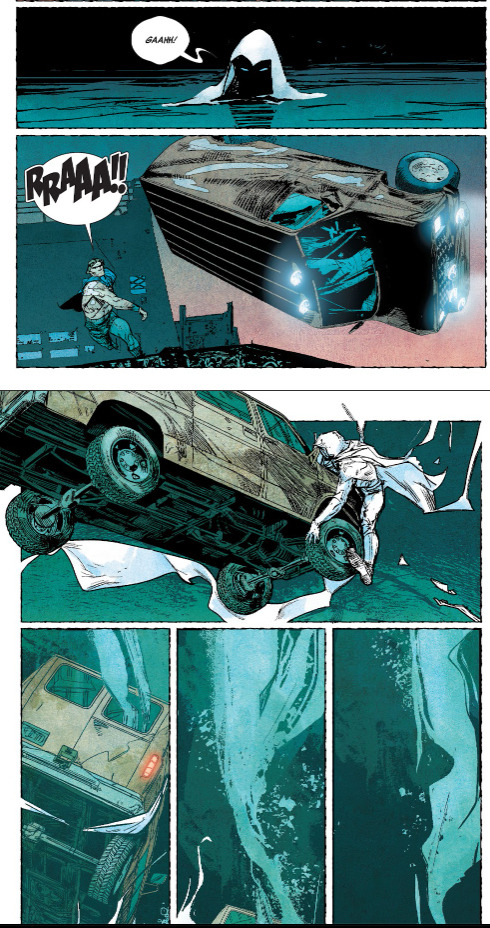
One of the thugs from earlier is still alive and he chooses this time to shoot the giant in the arm.
Unfortunately this upsets the giant who comes over and crushes his skull.
Disturbing. But the it's done well with the art style. You see him place his boot then a black frame that says "CRUNCH". This is how you censor but imply the violence. Unlike in Bemis' run that just shows you all the gore in the worst way.
It's amazing how much better I can look at this in comparison.
But an aside: I enjoyed this run until it got to a VERY specific point. We'll get there together, friends. Until we get to that point, we're going to enjoy the art and have fun with our buddy Moony.
Big guy gets ack on the boat and starts to drive away. Suddenly he's whacked in the head by a fire extinguisher.
We see a cloakless/hoodless/maskless Moon Knight wailing on him.
Marc heads down into the cabin thing while the giant is dstunned. He wants to know what the cargo is.
Ohhh hey.... Okay.

So… There are some of you reading this that know exactly what that is. And there are a LOT of you that don’t know other comics or movies and have no idea what that is.
That’s an Ultron. Tony Stark did Tony Stark things and created a super power AI system called Ultron. And in classic AI comic book fashion, it immediately took over EVERYTHING and set out to destroy the world. They eventually defeated it, but it keeps popping up. You’ll find hidden saved files in old computers, SHIELD helicarriers often find ultron files in their systems. Sometimes you find one of the mass produced robots that still carry the potential to boot up and spread the virus around again.
Marc picks up the Ultron skull, wondering why they have a dead Ultron.
It's at this point that he realizes he just knocked out the only one on the boat that was driving.
He's doing fine.
He gets knocked off the boat again and clings to a rope hanging off it. At this point the boat is illuminated by something from above.
Giant man wakes up and yells at the sky about "you better have my money!!"
"You should have thought about that before you killed my employees."
The boat blows up and Marc manages to swim away with the Ultron head.
Back at his place, he calls the Avengers to give them an update.
Again, I want to remind everyone that the Avengers are based out of New York and Marc is in LA. Are they going to fly out there to look at an Ultron head? It's a 5 and a half hour non stop flight on a regular airline.
So...This is another clue that something is wrong here.
They debate on why someone wants an Ultron head.
It IS made out of adamantium alloy, which is very valuable.
I also want to say that I love how they draw Marc here.
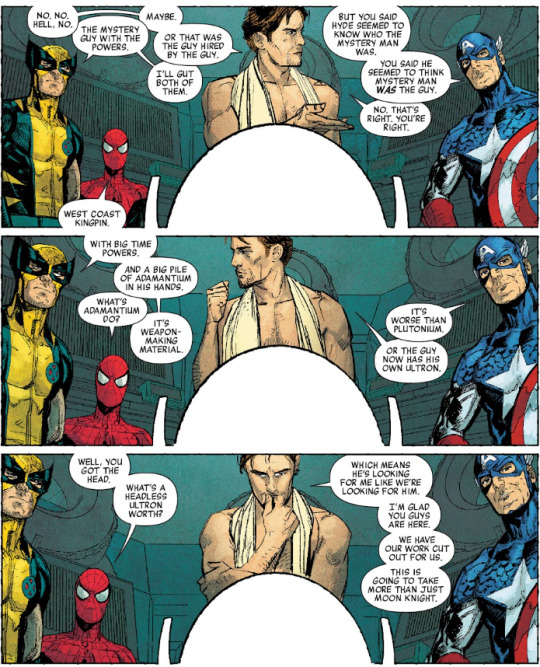
So Marc, Captain America, Spider-Man, and Wolverine stand around staring at the Ultron head for a minute.
"You got a good look at the mystery power?"
"Nope. Not from lack of trying, though."
"Hey, Man, you went toe-to-toe with Mr. Hyde."
"Barely."
"That's pretty impressive, my friend."
"I think I broke a rib."
In trying to figure out who the new power player is, he decides that they at least have one up.
"Which means he's looking for me like we're looking for him. I'm glad you guys are here. We have our work cut out for us. This is going to take more than just Moon Knight."
This is heart breaking to hear once you actually know where this run is going. And he isn't alone. Where are Jake and Steven? Why are they banished?
I know that Jake doesn't travel. Jake never leaves New York. I've never really explored why that is. But in Moench's OG run, Jake NEVER left New York.
And writers always leave Steven out. No one since Moench has been able to handle him to this point.
So here we are, Marc Spector making home in a new place and Jake and Steven aren’t there. Then the Avengers show up randomly and tell him to start being Moon Knight again and that he is needed.
And then we are left with this image, which is our biggest reveal that maybe… Maybe something isn’t right here…
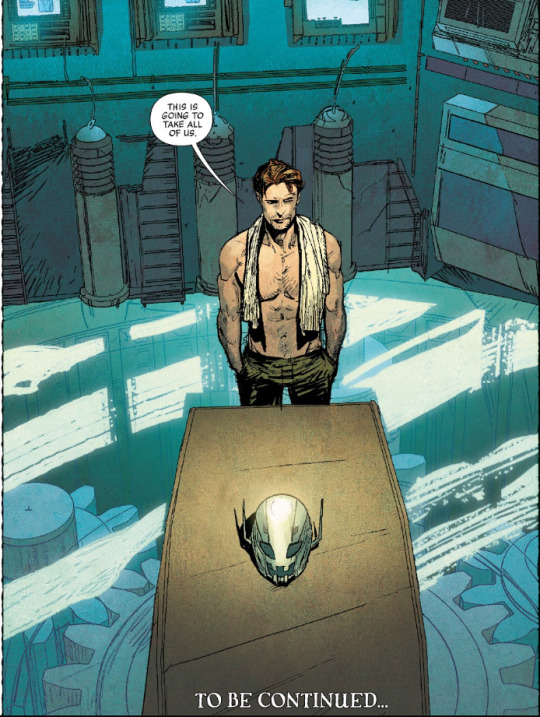
So what do we know in the first issue? We can’t trust Marc’s perception of things.
We also have yet to actually address Marc’s D.I.D. They’ve only casually mentioned him being ‘mentally disturbed’. He’s built up what looks like a nice comfortable life for himself in LA and here the Avengers come in (supposedly) and put him back into position to ruin this life.
We know Marlene left him. And his head-mates are being pretty quiet. We can only speculate that we are meant to believe that the ‘Avengers’ are only in his head.
There’s more going on here than Ultron. And in issue one, I’m optimistic. I love the art, Moon Knight is being Moon Knight. But you do get the sense that something is brewing and all you can do is hope that it’s not bad. We have no REASON to think it will be bad at this point. We’ve not had an atrociously bad run yet. We’ve only had mismanagement.
Issue #2.
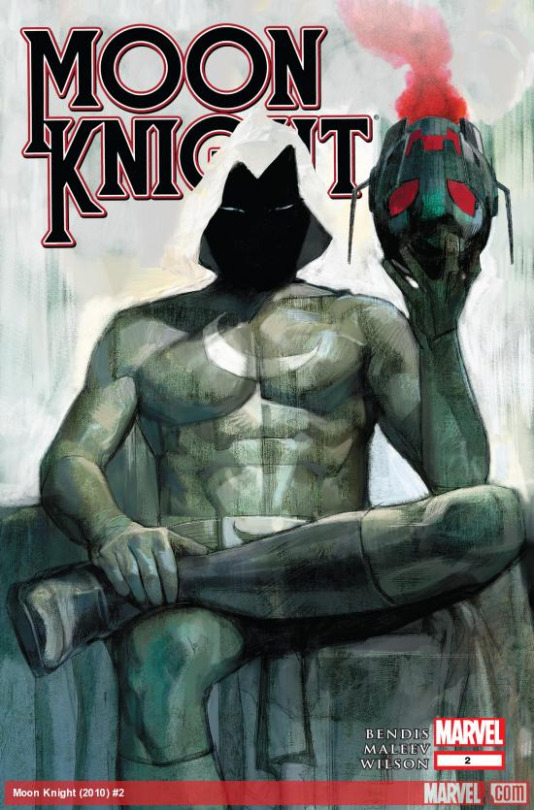
DAMN fine art, Maleev. Look at the white! The face is a little creepy, but look at that cape!
Title page has the usual blurb and a recap.
"Marc Spector has resurfaced in Los Angeles as the creator and producer of the wildly successful TV show 'Legends of the Khonshu'. As Moon Knight, he intercepts an illegal delivery of an Ultron robot body. The mastermind behind it is unknown, but the battle is fierce and Moon Knight barely escapes.
Guiding him through this new mystery, Moon Knight is supported by his new multiple Personalities in the guises of Spider-man, Wolverine and Captain America."
YEP. There it is everyone!
2011. WAY past the point of DSM defining things and research absolutely could have been done.
But it wasn't done. They had zero interest in informing or teaching the audience about mental health. All they wanted was a gimik to lure you in and say "Look how crazy he is!" And now he's got "NEW" personalities that are also well known super heros!
*SIGH* Issue one was so hopeful. They could have gone so many other routes.
As I mentioned above, Marc has set himself up to be alone. When has Marc Spector ever done well when left alone to his own devises?
Marc has set himself up for massive failure and is on his way for another break down.
But they could have left him alone. Shown him being alone. Shown him struggling alone. They could have then re-introduced Steven and Jake and well....LEMIRE.
Anyways, let's see what happens in issue 2.
We open with Moon Knight, Spider-man, Wolverine, and Captain America overlooking the city.

I love when they get carried away with his cape. It’s like his cape is an entity of itself. Look at that majesty.
Marc has intel and they are deciding on who gets to go investigate. 'Wolverine' decides to go in.
Marc tells him no. "This is my city now. That's the whole point. I'll go."
"I think you should go in undercover first. Stake it out. Lock your target" -Captain America.
"You WOULD think that. I say dive in and tear the place up. That's the only language they understand. It's the only language they respect." - Wolverine.
Cap just wants to shut down the operation.
"A grenade can shut that place down. We're aiming higher. We're aiming for the person who thinks this city is up for grabs and thinks they need an ultron."
'Spider-man' volunteers. No one would expect him.
Moon Knight notes that "It's not like I can stop him."
We head to a sort of strip club sort of thing. The manager woman is in charge of info. A lot of powerful men come to her club/bar and these men often let slip information to the girls that help them 'relax.' She pays the girls for collected information.
She finishes her little speech and Spider-man interrupts.
"Did I miss the audition? I have a dream, you know. A dream to dance!"
"Get out of here or I'll kill you."
"I'm sorry, I don't care for the way you're speaking to me--I'd like to speak to the manager."

So they way they have it, the “Spider-Man personality” is in charge and the others watch and let him act. He has the mouthiness of the REAL spider-man, but he also lacks the strength and acrobatics. This puts him at a disadvantage, as he’s expected to do the same things, but can’t. This honestly is going to go for Wolverine and Captain America too. Three people that distinctly have super powers and skills that Moon Knight and MARC do not have!
An interesting solution is that Spider-man uses web shooters.
And THIS 'Spider-man has hidden Moon Knight's truncheons in the shooters so they get hit by the web and also whacked pretty hard too.
What is so frustrating is that I'd just rather watch Moon Knight fight the bad guys and not 'fake spider-man'.
And the boss lady gets hit by the web shooters with the hidden truncheons inside. She instantly knows "That's not Spider-man."
She starts to fight back, asking who he is.
"Who are you?"
"Who am I? I? Me? People have heard of me! The big question today is how far down the criminal food chain are you?"
She starts to kick his ass.
She puts him in a choke hold demanding to know who he is and who sent him.
Marc and Wolverine start to argue inside the head space. Wolverine wants to step in but Moon Knight wants to give Spider-man a chance.
The mask is ripped off and they start to black out. Wolverine steps in.
The webshoots extend out the retractable claws.
Just as he gets the upper hand, one of the stripper girls tasers him, knocking him down.
He fights through it. The taser doesn't really affect him.
He webs her and the main boss lady picks up the fight.
Captain America is not impressed with the fight. "You're not learning anything and you've made your point. Wrap it up."
Just as he starts to get the upper hand, one of the bounces shoots them in the shoulder.
He doesn't heal like Wolverine would.
He blacks out.

See, my issue is that the writing team doesn’t know anything about Moon Knight. In fact, they know so little that they think he’s boring. So they bring in familiar characters in an effort to ‘make him interesting’. But Moon Knight is NOT those characters. So you end up with a cluster of a whole bunch of mischaracterization on BOTH sides. You got Wrong Moon Knight and you got Wrong Spider-man.
Boss lady tells the other girls to go home and not to talk about anything that just happened.
She says that their BOSS will want to talk to this guy and find out who he is.
They go to move Marc and suddenly one of the stripper girls attacks.
She knocks out the bouncer then knocks out the boss lady.
Marc wakes up much later, patched up in a bed.
Mystery lady tells him "You ruined my cover, Moon Knight."
She tells him that they have mutual friends like Steve Rogers and Matt Murdock.
Her name? Maya Lopez. Hey! It's Echo!
"I was an Avenger for all of 44 seconds."
I...I've never read anything with Echo. I actually have a comic of her team up with Dare Devil waiting in my stack of comics to read.
She was supposed to get her own MCU show on Disney Plus.
I also know that when Greer met up with Marc in the MacKay run, Echo was the one that warned her about what it was like to be with Marc Spector.
I ALSO know that they call her Echo because she's deaf.
That is the extent of what I know about Echo.
Let's learn together!
She tells Marc to look at her when he talks. He figures out it's because she's reading lips.
"You're deaf?"
"I know what's wrong with me. What exactly is wrong with you?" She asks as she holds up the Spider-man mask.
Back with boss lady, we see her talking to her own boss.
She explains that she once fought the Black Widow and Captain America.
"This guy--This guy tonight knows how to fight. I know when someone has been trained. This guy--"
They talk about how they looked up Spiderman and found him still in New York. They also figured out that the one they were fighting was "Moon Knight dressed as Spider-man."
"And acting like a crazy animal."
"Moon Knight."
"Or a crazy guy who thinks he's both. In this world...Never underestimate a good crazy."
The big mystery boss knows Moon Knight. He's faced him rescently apparently.
"He has something of mine and I need it back."
He approves her to hire a team and hunt Moon Knight down.
END ISSUE.
Ya'll...There's so much going on here. My mantra? "At least it isn't BEMIS.'' That's not a good plug. 'Better than Bemis'. That bar is so low that it's buried six feet under.
Also the introduction of Echo is going to get messy. She’s there to be the ‘voice of reason’ to his ‘insanity’, but she’s also there to potentially be a love interest.
Lemme do a little google search real quick.
Okay... She's Native American of the Cheyenne nation. Created in 1999. She first appeared as Ronin in 2005 by Brian Michael Bendis. (That explains why she's in this).
After Kingpin killed her father, he adopted her. Fisk pitted her against Daredevil. She also had a relationship with Matt Murdock cause of course she did. (Everyone has slept with Murdock. EVERYONE.)
Her abilities are photographic reflexes, much like that of Taskmaster. Meaning she can learn people's fighting styles.
Okay. She's interesting.
Makes me sad that she’s just going to be used in this comic to give the reader a point of stability and also a love interest.
Issue #3.

I like the soft colors in the art. And at first glance you get excited because “Bullseye!” And I love a good Bullseye run. But then you notice that jaw line looks very familiar and also he’s holding a familiar looking crescent and you realize what’s about to happen and you’re just disappointed again…..
ALRIGHT. We open on Marc driving a car and making a call to Maya (Echo).
"Hi Maya...This is Marc Spector."
"I'm sorry?"
"From last night."
"What do you want?"
"You believe it's me...Cool."
He spoke to their 'mutual' friends who vouched for her. (I bet Murdock vouched for her).
"If you're not still mad at me for blowing your cover and maybe ruining your life, I thought mabe we could get together and discuss, um, strategy."
Sure. Sure Marc... Strategy.
He invites her to eat. She turns him down.
"I think you might be insane, and I have had enough insane men in my life to last me."
[....]
"I think you're thinking that last night was indicative of my overall behavior and personality."
"It wasn't?"
"It probably was, but I don't think that--"
"I'm hanging up."
"I need help, Maya. And you do too."
We have some serious discrimination going on. The constant use of outdated language to lesson Marc's credibility and constant second guessing him.
Marc gets to the studio to find his assistant there waiting with a list of issues.
The usual studio stuff.
Props have issues, there's calls, and "they still haven't cast the French Guy."
"Not French."
"I thought--"
"He doesn't HAVE to be French. I said he was based on a French person."
(Does this mean that I cacn still dream of Pedro Pascal as Frenchie?)
Anyways... He heads in to a tech person named Buck.
Marc hands him the Ultron head. He asks him to take a peak at it and let him know if it's legit.
We head back to three months ago when Marc was setting up the show and casting people.
Marc had asked for a list of "soldier of fortune consultants".
Marc starts to look through the files.
Honestly, considering his past and connections, he probably knows most of the old timers personally.
He finds one that makes him pause and he tells his assistant that he wants an interview.
Turns out Buck was that guy.
Marc asks Buck how long he's been an Agent of SHIELD.
He recognized the name of a company that Buck listed as work history on his resume.
A company owned by SHIELD and stationed in Latveria (Home of Dr. Doom).
Buck denies it. It's all classified, after all.
Marc tells Buck that "I need a guy who knows weapons and armory. I need a guy who thinks outside the box and knows not to ask questions. I need someone I can trust with my life."
Of course Buck is cagey. Wants to know how Marc got access to the files and what not.
"Do you know your super heroes?"
"Uh...Sure."
Marc tells him. We don't hear what he says.
"I...I, uh... Never heard of you."
"Are you serious?"
"Just messing with you."
Yeah, there was a long time when NO ONE knew who Moon Knight was. Somehow all the bad guys and street people knew him, but NONE of the heros knew him. Just called him "that crazy moon guy."
Marc hires the man as his 'weapons expert' for the show. He also asks the man to work on making special tools and weapons for his 'special needs'.
Here’s Buck at home relaxing.

Oh hey! Bullseye!

So we see "Bullseye" threaten to torture and cut up Buck if he doesn't tell him who Marc Spector is.
Buck refuses to talk.
Bullseye threatens him again and Buck figures it out. "Mister Spector? Is that---Are you--?"

Firstly, where did Marc even get that outfit? And the spike dagger. Bullseye got the spike daggers when he killed Electra (Daredevil comics my old beloved dumpster fire that you were).
Marc apologizes and Buck punches him. He beats on him a moment, pretty pissed off.
"You know I could disarm you and end this in a second, right?"
"You never touch me!"
"Come on. Compared to what they did when you joined SHIELD this was nothing."
"I don't care if you think I--"
"You know I had to."
[....]
"Man, how crazy are you?"
There it is again. And having Marc dress up and mimic Bullseye's manners and expressions is an interesting choice when we already know that he's dealing with being Spider-man, Wolverine, and Captain America too. He's plaing with fire and I can see where Bendis is going to take this and I don't like it.
And this brings us to the present with Buck analyzing the Ultron head.
Turns out to be a real Ultron head.
"The head of the most powerful artificial intelligence known to man cut off from its regenerating power source--"
Buck asks if they should take it to Tony Stark.
Marc doesn't like Tony Stark. This is fair. Tony has never exactly been fair to Marc.
Apparently Hank Pym also had a hand in creating Ultron. That hangs together. (I am not a fan of comics hank pym. He's not a good person).
Marc tells Buck he's going to give it to Steve Rogers when they are done with it.
Buck keeps telling him to get rid of it. WHoever the LA kingpin is, he's going to come looking for it either for parts, the dangerous tech, or to plug it back in and sick it on the world again.
Marc keeps brushing him off.
"Meaning that you should get rid of it immediately...Was my point...That you completely missed. Because you're crazy."
So we head back to boss lady, AKA "Snapdragon". She's talking to a group of assassins for hire. A group called "Night Shift".
Her boss wants to have a chat with Moon Knight and she wants to know who he is.
END ISSUE.
Yeah, you guys can see the growing motif of this run, can’t you? “Wow look how crazy he is!” And it’s going to get worse.
If Aaron was a problem because of the lack of religious sensitivity and research, then Bendis is a problem because of how he handles the topic of Mental Health. (Bemis was just a problem. Every problem forever. Too many to name.)
So let’s head into Issue #4.
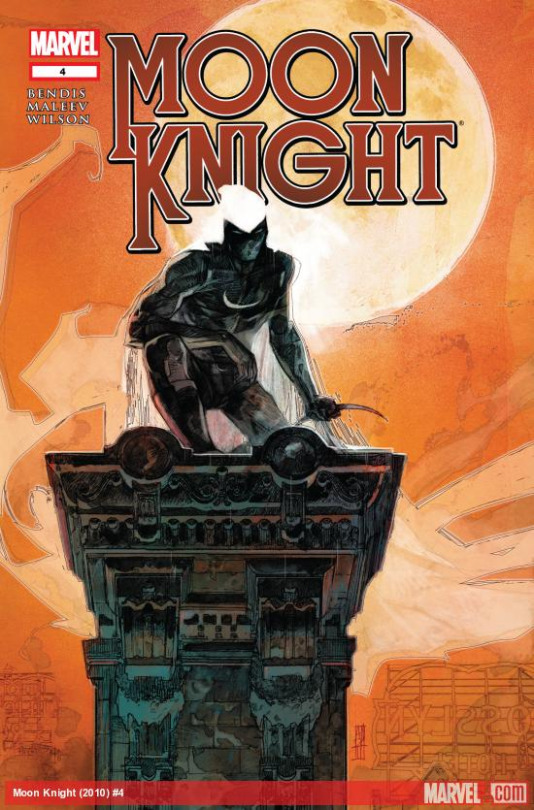
Maleev did all his own covers for the runs. Not a common thing to do. I just love how all the covers have such striking colors and how the cape and cowl are always just so BRIGHT white. It’s pretty, okay?
Alright, we open up on Avengers Mansion somewhere in New York. Carol Daners answers the phone (Captain Marvel).
Maya Lopez (Echo) is calling them.
She's doing a check in to find out what the Avengers think of Moon Knight.
Which, fine. If you're going to work with a guy or potentially be interested in them, you check in with your friends that know them.
But ALSO...The Avengers have always been very discriminatory against Moon Knight.
They don't trust him because they think he's dangerous because they think he's insane.
They don't ever make ANY effort to understand what his illness/problems are. They never look into his disorder. They never look into Marc's PTSD. They never take the time to talk him through things.
Much like they never really accept or try to deal with the Punisher's PTSD. He's always just an evil murdering man.
Maybe this is why Marc and Frank have always gotten along.
Spiderman sometimes is kind to him and works with him, but there is always the background joke about Moon Knight being "Loony".
The only one that really gets on with Moon Knight is Ben "The Thing" from FF4. And that's because they're both Jewish and Ben needs more Jewish friends.
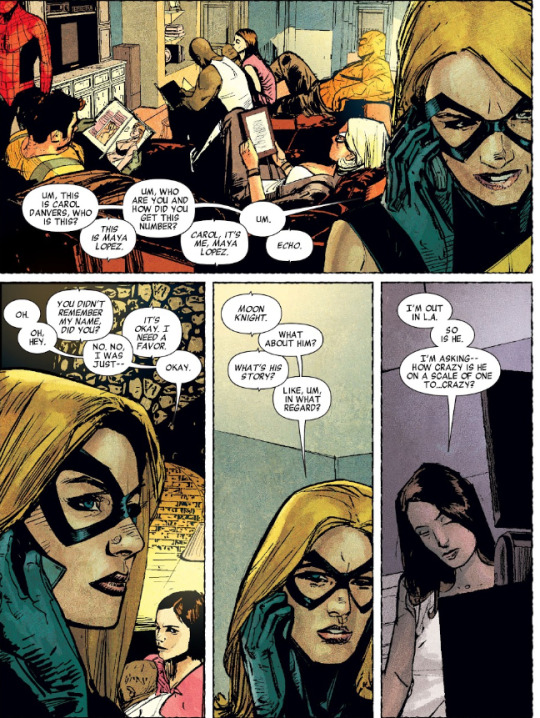
ANYWAYS. She asks about Moon Knight.
"I'm asking--How crazy is he on a scale of one to...crazy?"
Oh! This brings me to the well known panel that you should all recognize!!!!
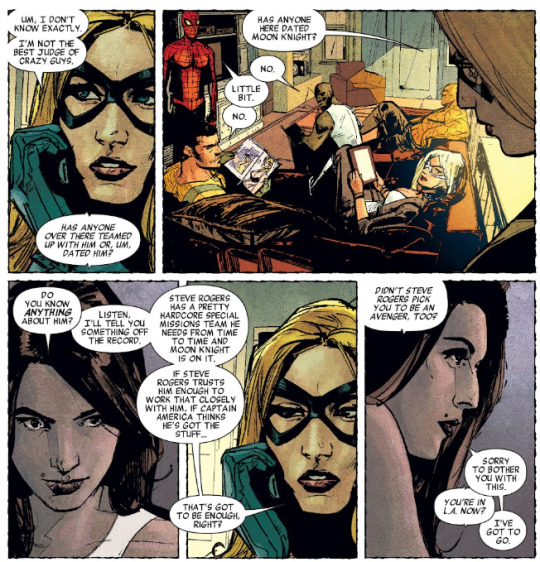
Now you have the context for that panel!
Speaking of discrimination...
Echo calls people all the time. And each time, the person on the other side will go "Wait, how are you using the phone if you're deaf?"
She has a speech to text function that puts their words on her computer screen.
But no one thinks of things that are meant to help those with hearing disabilities. They instantly just think "She's deaf. She can't use the phone! She must not be deaf!"
Ahhh...Avengers...
Back in LA, we find MArc waiting at a hot dog stand where he invited Echo, waiting to see if she'll even show up.
He sits there with 'Captain America', 'Spider-man', and 'Wolverine'.
Wolverine tells him that Marc doesn't need her.
Spider-man thinks it's just a team-up.
"This ain't about a team-up. You know it and he knows it."
"Why can't it be both?"
"Because it just complicates it all."
"Why can't he have a nice girl?"
"Because the damn moon god Khonshu told him he brought him back from the dead so he'd make the world more livable.
Not make crap TV shows and date third-string Avengers."
"Why can't he do ALL those things?"
(I'm a spider-man fan and I love when he is the young innocent one that just wants people to be happy. And considering that THIS is not the real Spider-man, but just Marc's perspective of Spider-man, it makes sense that Spider-man be seen as the one that doesn't understand and just wants to do his best and make people happy. See, THAT is an interesting take and psychological analysis. But Bendis isn't aiming for that or going to explore it... Damn it.)
Captain America reminds them that Echo knows more about what's going on than they do and they need her info.
"The woman's been under-cover in the LA underworld. She knows more than us. We need her."
And Maya shows up.
"I must be out of my mind."
"Oh, come on..."
"Out of my mind."
So he asks her what she knows and how long she's been undercover.
She tells him to go first.
"Listen, if you're here, you checked on me like I checked on you. You know I'm not the idiot you're acting like you want me to think you think I am."
"What?"
"Let's just cut the sass down and have a real conversation. Wouldn't that be nice, if two people who do what we do had a real conversation?"
"It's hard...It's hard to trust...sometimes..."
"I know. Believe me, I know."
They talk a bit about Marc's show and her position in the strp club.
As they talk, a sharp dressed man shows up and comments on what a cute cupple they make.
"What a cute couple."
"Excuse me?"
"I SAID you're a cute couple. What are you, deaf? Oh yeah, you are, aren't you...Eco."
She asks if Marc knows who this man is.
"You see him too?" Nice Marc. Subtle.
The man introduces himself as "Tick Tock." He's a member of the Night Shift.
One of the guys has a pretty cool design. Reminds me of the Classic old old comic/radio show "The Shadow".
The lady's design is....Why is there always a naked lady with tape barely covering up all of her bits? How is that efficient?
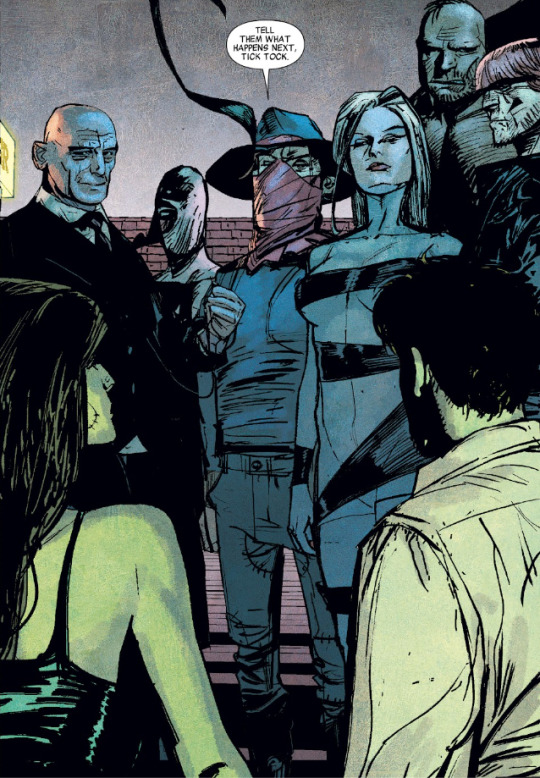
Tick Tock claims to be able to see the immediate future.
He sais that in one future they fight and it doesn't end well for anyone.
Marc and Maya don't have powers, but the Night Shift members do.
'Wolverine' decides he isn't putting up with this shit. The flake claws come out and they elect to fight.
The Moon Knight cape comes out and he and Echo start to fight back.
It's a pretty good fight. Echo saves his tail a few times and he takes the hits easily.
The Wolverine claws come out a few times and make a mess.
They take out the baddies but the cops are on the way. Cops usually don’t like Vigilantes and this is LA, where they aren’t used to the New York crew.
And….The only cop that ever liked Moon Knight was Detective Flint.
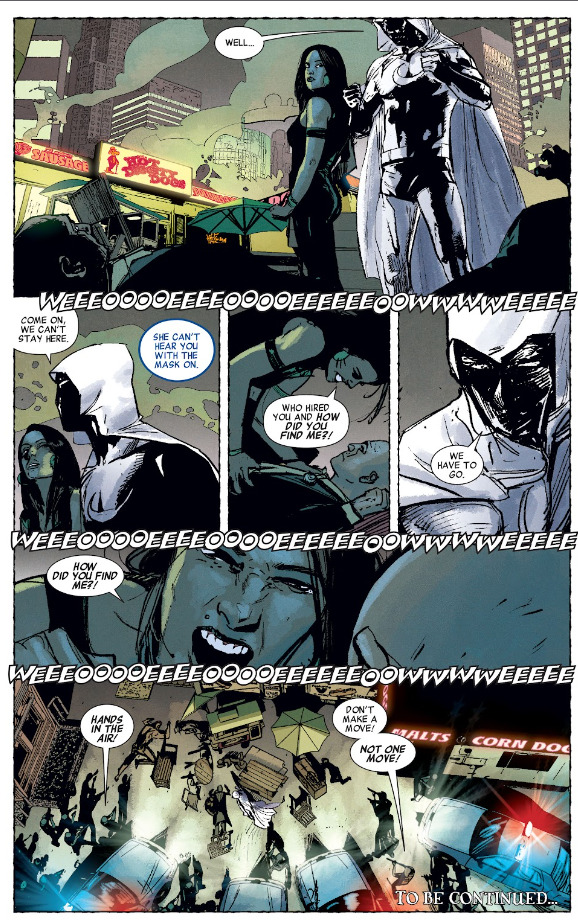
END ISSUE. WOO! Blazing through!
What gets me is that this HAD the potential to be interesting. It could have been an interesting run! Why did he have to make up the Avengers? Why not just embrace Moon Knight and let him be himself? He’s interesting enough without made up Avengers!
What’s more, you only got three of them in. And the three of them are only bits of themselves based on what Marc knows of them!
So you have the angry and eager to fight Wolverine, who could have just been Marc. You have the up tight analytical and reasonable Captain America, who could have been Steven! Then you have the heart who is gentle and wants to give people a chance but is still tough Spider-man….JAKE!
This run could have been FAR better if it wasn’t the Avengers, but Moon Knight wrestling with himself. Having all three of them trying to suddenly make sense of what it means to work together and coming up with their own fighting styles.
…..HERE’S ISSUE #5.

I actually don’t like this cover. The colors are nice. The art still is on point. But I just really don’t like this cover.
So the cops show up and instantly go "WE GOT MOON KNIGHT!"
Yeah... Most of the cops don't know 'what a Moon Knight' is.
The internal conversation is Spider-man wants them to run. Captain America tells them that they are an Avenger and should explain things to them.
"Officers, I am here to cooperate. I will be more than happy to tell you exactly what just happened. I am actually, believe it or not, one of the good guys, if you'll just let me--"
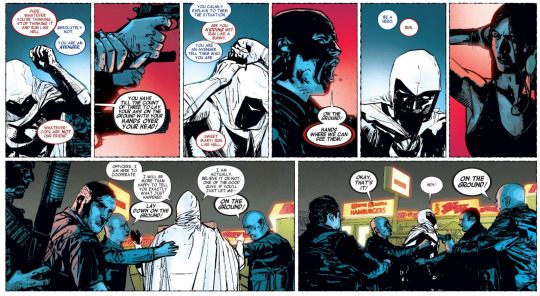
He does try to calmly explain to the officers what's going on, but they start to get rough and push him around. What gets me is that Moon Knight IS trying to be reasonable. He tries to talk calmly. To explain things. He tries to be peaceful.
It never goes well for him. No one listens to him. No one lets him explain. They assume the worse of him.
Now Wolverine is pissed and wants to get involved.
Cap and Wolverine start yelling at one another and Moon Knight is not having a good trip.
One of the cops says he's going to sell the pictures of Moon Knight getting arrested for tons.
Wolverine wins the argument and Moon Knight starts to fight and breaks free.
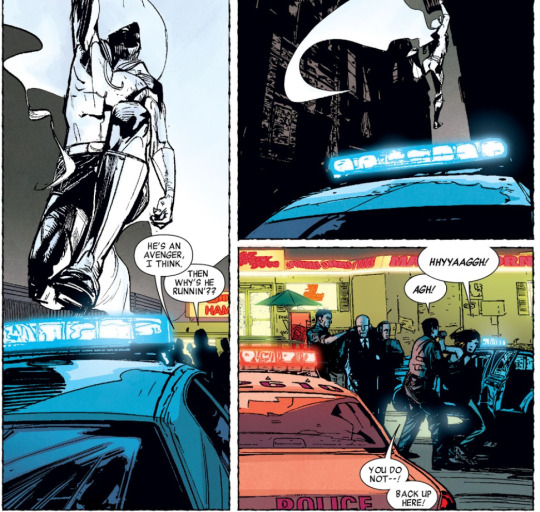
The cops attempt to bring Echo in and she puts up a little fight then gets tazed.
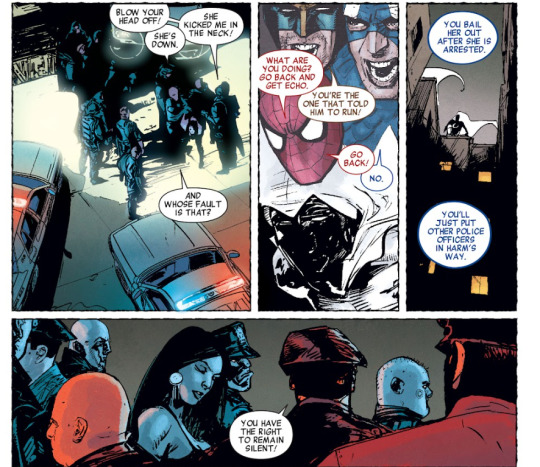
Yeah so we get lots of scenes of them yelling at Marc.
They yell at him for leaving Echo behind. But Echo fights the police off and steals one of the cop cars.
Moon Knight follows and joins up.

I can’t fault the comic for the action sequences. They do have a good balance. (Unlike in Bemis where everyone is either just standing there grinning like idiots or it’s chaos and you can’t tell what’s going on except that there is gore).
The banter and conversations are also well managed. Coming from the Bemis run, where every other panel was just a WALL of exposition that made no sense, I appreciate the balance of conversation, action, and stillness. So, points to Bendis and Maleev on this one.
They park the car and have a small argument.
She blames him for bringing 'madness' into her life.
He points out that the Night Shift was actually looking for HER and that they were tracking her, so it's her fault for the madness.
She agrees. "So that makes us even."
She can't go home. The police and bad guys know who she is now.
He tells her to come to his home. Smooth.
They have a moment and he kisses her.
She punches him in the face.
A lot.
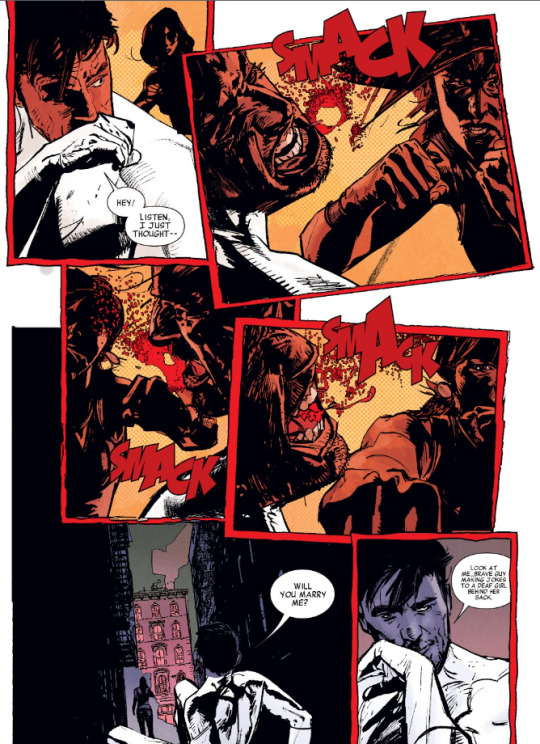
I won't make you squint.
"Hey! Listen I just thought..."
Gets beat up.
"Will you marry me?
Look at me...Brave guy making jokes to a deaf girl behind her back."
Alright we head back to Buck. He's at a club. He gets a phone call and heads out.
He's gotta go pick up Marc, who is sadly walking home in his Moon Knight skivvies.
"Hi, Buck."
"Mister Spector."
"Thanks for coming to get me."
"What are you doing in an alley?"
"I didn't start in the alley."
"Who used to do this before me?"
"A guy."
"Where is he?"
"He got sick of me."
"Is he alive?"
"I think so. I hope so."
Frenchie will forever be a sad place in my heart. I miss him and I hope he is alive and well.
We head to the police station where Tik Tok of the Night Shift is being interrogated. He's being interviewed by a former New York cop. He didn't like the Supervillain and Superhero business so he went to LA to get away from it.
As you can imagine, all this recent comotion doesn't have him very happy.
He wants to make sure the whole lot of the Night Shift stays behind bars forever.
But he gives him one opportunity to give up some info and walk out.
"Who hired you? Who sent you after Moon Knight? You give me a name... You walk out of here."
Tik Tok thinks it over.
"You don't, and I will laugh the day I hear that the punisher finds his way into the prison you're rotting in. Just say the name."
Tik Tok starts to talk when suddenly a lawyer comes in and tells Tik Tok that he's being sprung.
The lawyer tells him that they can't hold any of the Night Shift because the police let them be beaten by 'drug addict maniacs'.
Tik Tok walks out and the police guy is pissed.
"I hope you know what you're doing, Moon Knight. Because it's all on you."
END ISSUE.
So… You see my frustration setting in here? This comic run has SO much potential. There is so much more they could be doing and instead they are taking the “HE’S SO CRAZY” route. The art is good. The pacing is good. The Dialogue is pretty evenly placed. Even the overarching plot of the LA kingpin and Ultron head is not bad. It’s just… Why did it have to be Moon Knight?
When you can replace the main character with any other marvel character and still have it be the same, this isn’t a Moon Knight issue. And when the writer is so used to writing for other characters that they end up making it about those other characters, they shouldn’t be given the Moon Knight comic and should just stick with what they are good at!
….At least it isn’t Bemis…
Alright. Part two is coming soon! I’m going to start kicking these out fast. I got a timeline to get through if I’m going to hit all my marks by the new year! Stay with me people! We got this!
PART TWO HERE.
#Moon Knight#Moon Knight comics#Analyzing the comics#BENDIS#At least it isn't Bemis#Reading things so you don't have to#Marc Spector
11 notes
·
View notes
Text
It was a fool’s errand to try to upstage Jarvis Cocker during Pulp’s remarkable 1990s peak, but bassist Steve Mackey, who has died aged 56 after a long period of ill health, came close. A model of self-contained cool and dance-influenced grooves, he was key to the Pulp sound and look. On stage, Cocker was the insinuating, finger-pointing extrovert, but Mackey, reserved and elegant, was an attraction in his own right. His basslines gave Pulp a disco undertow that set them apart from their indie peers.
After he joined in 1989, the Sheffield group evolved: no longer struggling art-rockers but danceable art-poppers, they found their own space as Britpop’s idiosyncratic outliers. Mackey’s description of their sound was, without much exaggeration, “Eastern European Balkans disco with acid house and Sheffield bleep music”.
When Pulp made their mark in the mid-90s, some of the success could also be apportioned to Mackey’s skill at managing the band’s visuals with Cocker in the early years. A Royal College of Art film graduate, Mackey oversaw graphics and video ideas with Cocker, who had studied film and video at Central Saint Martins in London. The pair asked famous people to recount how they lost their virginity and made a short film of the answers, releasing it with the single Do You Remember the First Time? (1994).
For the sleeve of their 1994 breakthrough album, His ’n’ Hers, they chose Philip Castle to create the sleeve art because they admired his poster design for A Clockwork Orange. They got what they paid for. Castle’s hyper-real drawing made each member look confrontational, with Mackey at the back wearing a “Come on, then” stare. Conversely, a handsome 6ft 2in, he could also carry off a smouldering teen-idol look, as captured in an early-90s Jean-Baptiste Mondino shot.
Mackey’s interest in music was equalled by a love of photography, which he parlayed into a second career in the 2010s. He shot campaigns for Armani Exchange, Miu Miu and Marc Jacobs’s 2018 Redux Grunge collection; he also worked for the fashion magazine Love, founded by his wife, the stylist and editor Katie Grand.
Pulp had taken eight years off in the 2000s, and returned for a 2011-12 tour, but even if the reunion had lasted beyond the tour, Mackey was by then a busy freelance record producer and remixer. As producer and/or writer, he worked on Florence + the Machine’s debut album, Lungs, Arcade Fire’s 2017 album Everything Now and MIA’s Kala (2007) and Arular (2005) albums. His list of remixing credits is lengthy and includes Kelis’s Bossy (2006) and Cornershop’s Topknot (2009).
Can you say "Icon"?
#the realization that having missed the 2012 tour I no longer will ever have an opportunity to see pulp in its entirety is dawning on me#ouch#steve mackey#pulp#britpop#music
27 notes
·
View notes
Text
Last week, China’s National Bureau of Statistics announced it would cease collecting data on youth unemployment. The news came after nearly a decade of poor job prospects for Chinese people ages 16-24, often reported on by international media as mainly a problem affecting recent college graduates. Earlier this summer, ChinaFile’s Jessica Batke spoke with sociologist Eli Friedman, who studies international labor, about the reasons for joblessness among China’s young people and how it is covered.
Jessica Batke: If you’re graduating right now in China, if you’re coming on the labor market, what do you see in front of you? What are you worried about?
Eli Friedman: Well, you’d be worried about getting a job! That structural reality is very much at the forefront of what college graduates in China are thinking about, and it is a big change from much of the past generation.
Since the violent suppression of the student-led movement in 1989, the state struck a basic deal with college graduates, as well as intellectuals and youth more broadly: If they stayed out of politics and they could get into college, they’d pretty much be guaranteed a decent job that would allow them to live a life significantly more materially comfortable than their parents’ or their grandparents’.
That worked really well in the 1990s, in the 2000s, through the turbulence of the 2008 crisis, and into the 2010s. Yet, even before COVID, we’d begun to see cracks in that system. COVID is its own unique moment in all of this, but coming out of COVID the underlying stresses on the system have become really apparent. The previous reality—that if you went to college, you’d be likely to graduate and get a job that allowed you to live a life that more or less matched your expectations—is increasingly not the case. People go to college and might not get a job at all. Or they might get a job, but the pay, the conditions, and the hours mean that they are not going to be able to live a life that matches their aspirations. In some cases, the gap is dramatic. So there’s a lot of anxiety, and, in some cases, fear—or just “giving up.”
There is also the question of overseas students. For a long time, studying abroad in the United States, or in one of the other Anglophone countries, was seen as, if not a golden ticket, at least a pretty solid pathway to the middle class. That is no longer the case. We see that even students who have gotten into reasonably competitive universities in the U.S. or elsewhere are now worried about going back to China. There’s no guarantee that they will be able to get jobs either.
JB: So studying overseas used to get you a little bit of an extra edge, and it really doesn’t do much for you anymore?
EF: I think it does help some in certain industries, but a couple things have changed. One is that Chinese universities have gotten a lot better. The gap between a competitive school in the United States and a competitive school in China has shrunk. Chinese employers are seeing that and saying, “We can hire someone who went to one of the 211 or the 985 universities in China [which have been designated by the government as top-tier institutions], and they’re going to be just as well-trained, and possibly better-trained, than if they went to a school in the U.S. or the U.K.” And in general, I think it’s better for students to be able to go to high-quality higher-education institutions closer to home. It’s definitely a lot cheaper as compared to the United States, graduating with debt or having your family invest hundreds of thousands of dollars.
In terms of Chinese labor market dynamics, being able to say that you speak English is no longer the major mark of distinction that it might have been 20 or 30 years ago. And while the cachet of studying abroad has not been completely eliminated, I think employers are much more sensitive now. Looking at someone’s resume, they’re able to tell the difference between some very elite school like Harvard or Yale versus a fine but maybe less elite public school. So it’s a little bit more complicated than it was a generation ago.
JB: So are more of the Chinese students studying overseas trying to stay abroad rather than return home? In the U.S., everyone’s talking about how hot the labor market is, which would suggest there are jobs available, but the government also maintains lots of visa restrictions. Do you have any sense of what these students are doing?
EF: I don’t have any data on that, but I have seen data indicating the number of Chinese students coming to the United States has decreased. That’s for a number of reasons. Again, educational opportunities are better in China than they were a decade or two ago. In certain cases, U.S.-China hostility has made it more difficult administratively, or people have fears about being caught up in the China Initiative, which unfairly targeted people who are Chinese. But also, I think, because of a general sense of hostility; if you want to study something that’s potentially related to national security, why even bother? I believe, although I’m not 100 percent certain, that many Chinese students studying overseas have just gone to other Anglophone countries, like the U.K. So I don’t think it’s a general pulling back from study abroad, but specifically an issue with the U.S.
In terms of where Chinese students are going after they graduate: This is super anecdotal, but based on the students that I encounter here at Cornell, I’ve seen a clear shift toward more students wanting to stay in the U.S. This is part of a cultural shift that came out of COVID—so-called runxue, or running away. It includes people of that generation who are worried about what their futures will be like in China and are pretty eager to find ways to stay in other countries—the major challenges of staying in the United States notwithstanding, including visa restrictions and concerns about anti-Asian racism. Whether or not more people actually are going to stay in the U.S. after they graduate, I don’t know, I haven’t seen that data. But just in terms of my cultural currents, it’s clear to me more people are like, “If I can stay here, I would really like to do that.”
JB: What is driving the change in unemployment for young people? You said COVID was kind of its own thing, but that we were seeing some cracks in the system even before COVID—so it seems like there are longer-standing issues at play here. It certainly feels to me like I’ve seen news articles every summer for the last 10 years about graduate unemployment in China. Is this year actually any different than the last five or 10 years, in terms of unemployment? Is it just an issue of degree? Or is there a qualitative shift that’s making this different than before?
EF: The number for youth unemployment this year and last year is actually just about the same. If you go back and look at a year ago … I forget the exact unemployment figure, but it was also around 20 percent.
I should first say when I saw that number last year, I was shocked. My jaw dropped. For a long time, labor scholars had just assumed that unemployment numbers in China were manufactured. Unemployment rates going back for a couple of decades hover around 4 percent, with tiny little fluctuations. So I and most people thought, whatever, it’s one of the many manufactured numbers in China. And so when I saw this number I was like, OK, maybe China really had a very, very stable labor market for many decades. I mean, I don’t know, you never know with these things. But in any event, it was quite an acknowledgment of a systemic problem, if not a systemic failure.
This is speculation, but I think the youth unemployment issue has gotten even more attention this year because China is through with lockdowns. Last summer, China was still in the midst of all of the lockdowns, and so everyone knew that there was “artificial constraining,” particularly of consumption. It had a big effect on manufacturing as well. We saw it with COVID lockdowns in places like Foxconn and the Tesla factory and elsewhere. There was a sense that the state had taken extreme measures, restricting the economy and driving up unemployment. But we all knew that, at a certain point, the lockdowns were going to end, China’s economy would roar back to life, these problems would dissipate, and we’d go back to the previous three decades of the China boom. (I never thought that was going to be the case, but there was some hope, maybe some wishful thinking, that it would be.)
Fast forward to 2023. The lockdowns have ended chaotically, disastrously, and tragically. There was a brief burst of economic activity, or “revenge spending,” as well as increases in exports and what looked like some stabilization in the real estate market. But that very quickly petered out. It became clear by the spring that there was not going to be a return to pre-COVID assumptions about growth.
One of the reasons I think the numbers hit a little bit harder in 2023 than in 2022 is because we now understand there’s no easy fix. Last year the easy fix was to end the lockdowns, like the rest of the world had done, and get back to normal. That’s not true this year, and it raises a whole series of much more difficult questions about what ought to be done in order to address unemployment.
COVID, geopolitics, a lot of things that nobody could have predicted that put new pressures on the Chinese economy. But, if you look at the broad structural tendencies over the last 10 years, some very serious changes were always going to be necessary. That has only been intensified by contingent things like lockdowns and geopolitics.
JB: What were the needed changes?
EF: The main thing is the drivers of the Chinese economy, which have been exports and investment.
Exports are particularly important in the economically dynamic regions of the Pearl River Delta and the Yangtze River Delta. They are in many ways the foundation of the China boom that took off in the 1990s—a model of growth predicated on wage suppression. The whole comparative advantage that China had, as identified by the leadership in the 1980s, was this large, relatively well-educated, very cheap workforce. It allowed them to conduct production on a scale that was unimaginable for the other East Asian tigers, like Taiwan and South Korea, which couldn’t compete on scale, or, at that point, on the price of labor or land.
But then the cost of land and labor went up quite a lot—which I think is a good thing—but it meant that, purely on the basis of the cheapness of labor, China was no longer competitive. This was already true in the early 2010s. Indonesia, Vietnam, Thailand, places in Latin America—wages are all cheaper in those places. And wages are much cheaper in India.
So they needed to find new ways of competing and manufacturing. The state was very clear on the need to move from a so-called labor-intensive form of manufacturing to a capital- and knowledge-intensive form of manufacturing. Rather than making toys, socks, and little gadgets, they want to be making high-end electronics, medical equipment, and cars. They want to be engaged in leading-edge technologies, like electric cars, which they’ve been pretty successful at. But making that switch means it’s less labor-intensive. If you have a highly automated form of production that’s turning out something very expensive, like an electric vehicle, you’re absorbing less of the labor force.
The other piece is around investments. That’s the other thing that’s really driving growth. Especially after 2008, you saw much more employment going into construction—building infrastructure, building buildings, building real estate, and all of the associated industries related to the building of things.
JB: Steel, concrete…
EF: Steel, concrete, electric wiring, things like that. It touches on manufacturing as well, because as people are building houses, they have to buy furniture and dishware and all the things that people put in houses.
Manufacturing jobs in China peaked a long time ago, in the mid-2000s, even before the 2008 crisis. Employment in construction continued to go up because of all of the building, particularly after the 2008 crisis, when the state pumped $586 billion into the economy, which mostly ended up in infrastructure spending and the real estate boom.
Spending on infrastructure, which is debt-financed, has come up against some real limits. We see this with local government fiscal stress and their inability to service their debts. We also see it in the real estate market: [major property developer] Evergrande just announced losses of [$81 billion] for the last two years. That’s just one indicator of how badly the real estate market has [done], for all sorts of reasons. China’s population is shrinking. The cost of housing is just absolutely exorbitant.
To bring us back to the question of employment: The big economic drivers, which had been absorbing tens of millions of people migrating from the countryside into the city, are not really driving that much employment anymore. So the shift that China has to make, and that economists and the Communist Party have known about for two decades, is the shift to consumption-led growth. Premier Wen Jiabao was talking about it in 2004, almost 20 years ago. If you look at progress since 2004, consumption as a share of GDP is still down.
Services already do absorb a majority of employment in China, more than in the secondary industries of manufacturing and construction. But the kinds of service-sector jobs that are being created are pretty menial. And this is another really important feature when we think about how this shift is playing out. And when we think about the college grads.
JB: But if jobs are shifting away from manufacturing and toward services—knowing that some of the service jobs are menial—it still seems like there should be more jobs for college graduates. Why are there no jobs for these folks?
EF: One point that is important and is often missed in a lot of the media coverage: Media coverage is very focused on the college grads. I understand why that is. As a college professor, I think about college grads a lot.
But the number that is always cited, the 21 percent unemployment figure, is for all 16- to 24-year-olds. Within that, the proportion of people who are college grads is actually quite small. In China, you have nine years of compulsory education. In the ninth year—that’s age 14 or so—you take the high school entrance exam, and then you get tracked out. Some people go on to the academic high school route—and most of the people tracked into the academic high school route do get into university nowadays—but most people don’t make it onto that track. They either stop education after year nine or they go get some supplementary technical education.
So, if you’re looking at ages 16 to 24, it’s only the 23- and 24-year-olds that could conceivably be university grads. Everyone else in that age group are people who’ve already left school and are looking for work.
I actually didn’t piece that together when I first saw those numbers last year. But then when it hit me, I was like, “This is much scarier than I thought.” If you think of youth unemployment as just college grads, then you lean into the discourse—which is not untrue, but it’s only a partial truth—that college grads don’t want to take jobs in manufacturing, or they don’t want to get a job as a factory worker or in a restaurant. But, actually, the majority of these people did not go to university, and they’re still not getting jobs. That’s the thing that really worries me. It’s not just people turning their noses up at jobs that they think don’t befit a college-educated person. It’s people who are just not getting jobs at all.
Talking about the university grads more specifically: People take jobs because they need enough money to live the life that they want to live. But the gap between the life that they want to live and the jobs that are available is incommensurable right now. You can think about that in a couple of ways.
For one, the kinds of service-sector jobs that are overwhelmingly being produced just don’t pay you enough to live in the big cities where most college grads want to live. The income-to-housing ratio in large Chinese cities is among the worst in the world. It makes New York City look kind of affordable. So if you take the jobs that are available, then you’re not going to be able to buy a house. If you can’t buy a house, you won’t be able to get your kid into school. That is because employment in the formal sector and home ownership are often required to access [residence permits known as] hukou—without establishing hukou, you can be denied access to a range of social services including public education, health care, and pensions.
Now, there are other kinds of jobs that might pay you enough to live that kind of life. But these jobs raise the whole “996” issue—working 9 a.m. to 9 p.m., six days a week. You might have enough money to buy a house, buy a car, and maybe to pay so someone else can raise your child. But I think a lot of young people are not into that anymore. That was really dramatized when all of the 996 activism was happening among tech workers two or three years ago. And there’s a kind of generational difference. Back when [Alibaba founder] Jack Ma was still making public appearances in China, he was kind of berating young people, very dismissive of them, when he said it’s a “blessing” to be able to do 996 when you’re in your 20s—this is what you do when you’re a young person, you devote your entire life to working hard and you can enjoy life later. That fell really flat with young people in China who didn’t grow up in desperate poverty in the way that people who were in their 50s or 60s did. This idea that you have to eat bitterness for decades before you can take a breather … if you grow up living a middle-class life in a big city in China, you’re thinking, “Maybe there’s more to life than just working all the time.”
So, the jobs that are being created right now are either not paying young people enough to live in the city, or they do pay enough but people then can’t live the kind of life that they would like to live. That’s part of the challenge for the college grad specifically.
JB: If you’re the Chinese government, what are your range of options to deal with this? Or what might leaders be thinking about to try to engineer this economic shift? I assume they don’t have infinite time to make the shift, that there will eventually come an inflection point.
EF: There’s not an endless amount of time. If they don’t make a serious intervention, the vitality of growth will gradually be sapped, because they can’t depend on exports. We already see a reorganization of global supply chains away from China. Supply chains are not leaving China by any means, but China is going to be less central to the production of all kinds of commodities in the next few years.
The debt piece is also really important to the extent that households and governments are using their money to service debt rather than making productive investments. That’s also going to undermine the vitality of growth.
So it will be a long, slow decline. If I were a betting person, I would put my money on that, because the other options—which have been known for a long time, which are actually pretty clear and not all that controversial for economists—are very difficult politically. They’re very difficult because the system of growth for the last 30 years has created very rich and very politically connected constituencies that don’t want to change.
Let’s think about real estate and exporters as key groups in all of this. With respect to exporters, if you want to shift from the current wage-repression model to one predicated on a virtuous cycle of higher wages and higher consumption, you have to do two main things. One is you have to raise wages, obviously. One way to deal with this is to allow unions to bargain and collectively push up wages above what the market would determine on its own. The Chinese state is not willing to consider unions, because it thinks they pose a threat to political stability. Another option is that the state could just dictate. It could say, “In this industry, here’s what wages are going to be. We’re going to have dramatic increases in the minimum wage.” There were significant minimum wage hikes during the 2010s, but those increases have slowed considerably since Xi Jinping came to power. The state hasn’t done that. And so the question is, if there is already a dictatorial state, why can’t it just say, “Pay the workers more”? Because doing so would be a political problem. Whole economies are organized around exports; exporters and associated industries are very politically powerful. They have said, “We don’t want that,” and the party has more or less gone along with it.
The other side is social protections: health care. Pensions are particularly important. Education. If you talk to Chinese people about why they’re not spending money, their biggest concerns are about the future.
For example, “How much is it going to cost for me to educate my child?” Officially, compulsory education is free in China, and that is in a sense true. Increasingly, buying a house in the catchment area of a good school has become a more expensive proposition in the biggest cities. This is something Americans can certainly relate to. You’re not formally paying tuition for schools, but you are in essence paying for schools via the real estate market.
On health care, the state has increased investments in health insurance, but it remains extremely patchy, particularly for migrant workers. The subsidies offered in rural areas are wildly inadequate. Hundreds of millions of people fear they are one major illness away from bankruptcy. There’s no national health care system, and there’s no indication that they are considering the sort of comprehensive national system such as exists in many countries.
Finally, pensions are really a big issue, and they’re very, very politically complicated. Because society is aging, there are more and more people of retirement age. (China has a pretty low retirement age, 60 for men and 55 for women, which the government has considered raising.) The pension is a whole separate, complex issue. It is pretty uneven between rural people and urban people, between residents and migrants. Suffice it to say that for hundreds of millions of people, their pension is completely inadequate to live on. That’s why people are dependent on their children. But they only have one child. That child is paying the mortgage, but they can’t really support it.
So the answer to making this shift is raising wages and increasing social protections. The policy prescription is really not complicated. But how to do it politically is extremely complicated. Even a man as confident in himself as Xi would have a hard time doing it.
I think there’s also an ideological component to this. Based on what Xi and other leaders say, I think that they’re just a little bit neoliberal in this respect. Xi was very explicit. He was like, “We don’t want to have excessively generous welfare policies to support lazy people.” Despite the fact that it is the Communist Party, they just don’t see that as their job.
In terms of real estate, it needs to be a less central part of the economy. You have to have a property tax so local governments can generate revenue to support all the welfare programs that we have just talked about. But again, the real estate companies don’t want it. They’re extremely powerful. And lots of otherwise sympathetic middle-class people also don’t want it because Chinese people have a huge percentage of their wealth invested in real estate. They don’t have the same kind of options around equities and mutual funds that people and other wealthy countries have. And so they sink all their money into real estate. And for a long time, that was a really good deal. But if they sunk all their money into a house, and then all of a sudden, it’s being taxed at whatever percent a year, they might not have the income to pay that in addition to everything else they need. So it’s politically very difficult.
JB: I don’t want to do too much mirror imaging here, but I have been struck several times by things you’ve said that seem to suggest similar vibes in China and in the U.S. For example, Jack Ma berating people for not working enough felt very Elon Musk-y to me. Or young people, either “lying flat” in China or “quiet quitting” here in the U.S. And then you just mentioned Xi’s admonition against welfare for lazy people, which really reminded me of [former Republican U.S. Rep.] Paul Ryan’s welfare “hammock.” It’s striking how similar these sentiments seem.
EF: I think there are a lot of similarities. Since you mentioned Elon Musk, he’s actually tried to use the Chinese example to break his American employees, to get them to burn the midnight oil. The reality of what was going on at Shanghai Tesla was that workers were put in the closed loop in the Tesla factory during the Shanghai lockdown. They went in being told that they might be there for a few days, and they ended up there for [nearly eight weeks]. So that’s the model that appeals to guys like Elon Musk and Jack Ma. And I can tell you for a fact that the Chinese workers who were in there were not doing it because they’re more morally upright or more committed to increasing the wealth of the world’s wealthiest man. They just didn’t have a choice. I think we should commend Tesla employees in the United States for refusing to do that.
Your broader point about the similarities—not just between the U.S. and China, but also between China and many other countries around the world—is really important because sometimes amid all of the geopolitical strife, we imagine these two societies as fundamentally different. Actually, I think that a lot of the same global pressures are being brought to bear on both societies. A lot of the particulars are different: The expansion of higher education in China has been much more rapid; the social change and the generational difference in experience between people in their 60s versus people in their 20s is different for sure.
I teach at a university that has lots of young people from the United States and from China. I think that the broader question—about how people can make a decent life for themselves given the structural conditions—is something that’s troubling to people in both places, and that is unfortunate. I wish it were grounds for solidarity between young people of our two great nations.
JB: I’m a bit hesitant to ask this question, because there is a tendency on this side of the world to frame everything in terms of, “Is this going to be the thing that brings down the CCP [Chinese Communist Party]?” But a Bloomberg article last month quoted a report from advisors to Xi that said that if they don’t get a handle on youth unemployment it could cause serious political problems. Do you think this is becoming a more salient issue for the government? What might the government do to mitigate the possibility of serious political problems or unrest if it won’t alter the economic status quo?
EF: First of all, I think it’s a totally legitimate question to ask. What are the potential political consequences of this structural condition? I don’t think it spells the end of the Communist Party, and I think that we shouldn’t speculate about that too much. But we should think through what those potential political effects are.
As I’ve already said, after 1989, the central deal between the state and educated young people was that if they stay out of politics, they can expect regular material improvements in their lives. The Communist Party sees educated youth as one of their core constituencies that they really want to keep happy. Part of the reason for that is because of the Communist Party’s own history. They were founded by educated young people. Mao [Zedong] was working in the Peking University library. Deng Xiaoping had studied abroad in France. They’re keenly aware that dissatisfied educated young people can present a political challenge to the existing state. And so if that deal—political acquiescence in exchange for material improvement—is unraveling, then they’re going to have to find another way of handling this group of people.
The tools that they have at their disposal are different for college graduates than they are for lots of other people in Chinese society who are dissatisfied. The Chinese state spends a lot of time thinking about risks to political stability. When it comes to Uyghurs, they have one set of tools for overwhelming repression—camps, surveillance, all of that. They can’t use those tools on college graduates, for a whole variety of reasons.
But there are other things they could do around the margins. They could certainly do something with respect to housing. A robust public housing program wouldn’t necessarily require a complete overhaul of the economy. They could keep some of that capacity around construction going and allow people to feel a little bit less anxious about making a life for themselves in the city. We’ve seen some housing programs here and there, but it continues to be very piecemeal. And overall, urban real estate continues to be very market-driven.
The liquidation of the entire private tutoring industry—which is targeting young people before they graduate college—is an acknowledgment of sorts that young people in Chinese society feel like they’re under too much pressure, and they don’t want them to be going to all of these hours of tutoring. There have been efforts to restrict the amount of homework that schools can assign and to turn the temperature down a little bit on testing. All of that is an indicator that they’re interested in doing something to address some of these issues.
Assuming that they’re not going to be able to enact deep structural reforms that would really resolve this problem, which I don’t think is very likely, the question then is, if there are a lot of people with grievances, what are the likely political consequences going to be?
And I think that the political consequences will probably not be very serious. What will probably happen is that lots of people will suffer from depression and anxiety, and that what is a fundamentally social problem will be put on the backs of individuals to bear by themselves.
JB: Sounds familiar.
EF: Yeah, that’s true most of the time. As an educator, I see it very clearly, in rising rates of depression, anxiety, and other mental health problems among young people.
So I think that will largely be the extent of it. The avenues for political expression are pretty limited. You can’t join a political party, you can’t join a union, and you can’t form your own organization. There are online communities that pop up here and there, but if they get too big, they get censored and reined in. The state doesn’t have to use the kind of repression that they use against Uyghurs or Tibetans. They can use a more delicate form of oppression.
But in terms of political consciousness, I do think that there has been a significant shift among highly educated youth in China. I’ve seen this among my students here, and I’ve definitely seen it in the writing that students back in China are doing.
The clearest example of this was during the white paper movement. The protests were not representative of youth in general; the total number of people who were actually out on the streets shouting, “Down with Xi Jinping!” was pretty small. So who’s to say what the majority of people are thinking. But the fact that it was even possible, I mean, saying “Down with Xi Jinping, down with the Communist Party” in public was unthinkable in October 2022, and in November 2022, it was happening all over the place, including here at Cornell, and in many places around the world.
During private conversations with many people, I’ve seen folks who were previously quite patriotic and pro-government say, “Wow, if the government can just lock me in my apartment in Shanghai for months—me, a relatively privileged, well-educated person—what else could they do to me?” Also, the things the government has promised about a better life—trust the Communist Party and your livelihoods will improve—that’s not really panning out anymore. That has effected a change. Whether that actually eventually translates into action is another question. But it is now another problem for the state to manage, in a way that they haven’t had to manage, coming from what had been a pretty solid base of support for them for a few decades. The Tibetans, the Uyghurs, and Hong Kong were always troublesome for them. But here in the core, in Beijing, in Shanghai, and in the big cities, they have this other concern, and so they’ll have to pay more attention to it.
5 notes
·
View notes
Text
Checking in with SCOTT CAAN
The Daily Courier
6 Jan 2023
BY GEORGE DICKIE
In playing a Philadelphia police officer who is reunited with his missing son after seven years, Scott Caan found himself in unfamiliar waters. As a matter of fact, the character’s unique quandary makes it one that he’s sure no actor has ever played.
In “Alert: Missing Persons Unit,” an hourlong procedural drama that premieres Sunday, Jan. 8, on Fox (before taking its regular Monday time slot the following night), Caan (“Hawaii Five-0”) stars as Jason Grant, a Philly cop who is a member of the department’s Missing Persons Unit, who is reunited with his son Keith (Graham Verchere, “Stargirl”) years after the boy disappeared.
So while Jason and his ex-wife and fellow cop Nikki (Dania Ramirez, “Maids”) are overjoyed to have their boy back, they can’t help but notice things about the teen that don’t seem right and tell them he may not be their child. Which, Caan says, presented him with what he calls an “acting problem.”
“This idea of Dania and my character are trying to figure out if this kid is our son or not is really something that’s kind of unprecedented,” he explains. “You know, it’s not something you can go research, it’s (not) something you can talk to somebody who’s experienced . ... It’s something that you really have to figure out and dig into and it’s a complicated idea to try to figure out if this kid is our kid or not.”
“I read (the script) and I was like, ‘S..., I don’t know what I would do in these situations. I don’t know how I would act.’ ”
But while the role at times left him at a loss, Caan is thankful he had a very easy rapport from day one with his scene partner Ramirez.
“I don’t want to be too pretentious and talk about acting,” the son of “The Godfather” actor James Caan says, “(but she) brings a certain sensitivity out of me that I haven’t really been able to touch before . ... I think she’s great.”
Full name: Scott Andrew Caan
Birth date: Aug. 23, 1976
Birthplace: Los Angeles
Family ties: He and partner Kacy Byxbee have an 8-year-old daughter, Josie; is the son of actors James Caan and Sheila Ryan
TV credits include: “Entourage,” “NCIS: Los Angeles,” “Vice Principals”
Movie credits include: “A Boy Called Hate” (1995), “Enemy of the State” (1998), “Varsity Blues” (1999), “Boiler Room” (2000), “Ocean’s Eleven” (2001), “Ocean’s Twelve” (2005), “Friends With Money” (2006), “Ocean’s Thirteen” (2007), “Meet Dave” (2008), “A Beginner’s Guide to Endings” (2010), “Rock the Kasbah” (2015)
Did you know: In the 1990s, was a member of the hip-hop group The Whooliganz under the pseudonym Mad Skillz; has a black belt in Brazilian jiu-jitsu
Favorite book: “There’s a book called ‘Rule of the Bone’ that was always one of my favorite books. I’m a big (Charles) Bukowski guy. ‘Women’ was one of my favorite books.”
Favorite movie: “I’d say my all-time favorites would probably be maybe ‘Raging Bull,’ any Hal Ashby movie, ‘Thief.’ ‘Buffalo ‘66’ is definitely one of my favorite movies. There’s a movie called ‘The Two of Us,’ this Claude Berri movie, a French movie ... . I used to be kind of a movie nerd. I’m not as much now but I could list off 10, 20, 30 of my favorite movies.”
Favorite musical artists: “I would say A Tribe Called Quest, Gang Starr, the Smiths and Joy Division.”
14 notes
·
View notes
Text

So, in my personal headcanons, the entire 'Quirks' thing started in a technological equivalent of the 1990s. The first three generations of Quirk-users had tech associated with the 1990s, the next three, the 2000s, and the most recent two- the 2010s, with the anime being on the cusp of what is 2020s tech (in line with the ninth generation of Quirk users). Save for All for One and extreme outliers, anyone beyond the seventh generation of Quirk-users is dead. So the world is mostly populated by seventh, eighth, and ninth generation Quirk users- with kids being the ninth.

I understand most going the route of 'Toshinori barely understands tech and can only just send E-Mails', but in my own headcanons, that's- very much not true. He grew up around decently-modern tech, so he knows his way around it. He's had to live with it his whole life- but because of what a shut-in he is when he's not being a Hero, his grasp on memes, internet culture in general, and using tech outside of its base purpose...is beyond him.
Of course, if he had to, he could easily sort out more applications for the tech he does have (two phones as the baseline- one for All Might, one for Toshinori). But...he's never had the time, nor the desire.

I do think he'd be able to grasp the concepts relatively fast if ever he was shown, but...eh. That's me. I don't think of him as 'mmm dude cannot sort tech to save his life', so much as 'dude hasn't felt a need to figure out anything beyond the baseline'. Of course, now he's got an SO who's spent pretty much their entire life hiding in modern tech and the like, so- he's gonna learn pretty fast on at least a few things.
Though he still can't sort out tech specs to save his life...
And of course, if there are nine generations total, with the ninth being in their teens currently (Midoriya's generation) that means that a bare minimum of 215 years have passed since the first Quirk-user was born. Obviously this elongates further since some generations probably took longer to have kids, so I'd say a good 300 years, Earth-time.
Of course, my timeline assumes that All for One and One for All were born either in the first or second generation, which means All for One is easily a few hundred years old. Gotta love those longevity Quirks,---
#Through many battles/I have been tested/I’ve never failed/Never have been bested | Toshinori Yagi#i’ve got nothing else to lose/i’ve got nothing else to prove | headcanons#//I did this instead of wr1ting I regret nothing
2 notes
·
View notes
Text
AI Winter is coming
mostly @northshorewave who has been worried about this
The other day a friend wanted to show off his positive interactions with ChatGPT. He’d used it to write a 20 questions quiz for the party we were at. I asked if I could proofread the questions and promised not to look up the answers. It contained stuff like:
“Which one of these countries does not have a square flag? a) Switzerland b) China c) Britain d) Egypt”
Switzerland is the only one of them that does have a square flag. ChatGPT is an overgrown autocomplete that “knows” to associate the concepts “square flag” and “Switzerland” and the general shape of a quiz question, and mashes words into this template. When I pointed this out, my friend was rather disappointed and quickly set to reviewing the quiz.
Then I asked to use his laptop for a moment, and showed off ChatGPT’s propensity to hallucinate by asking it for a summary of a nonexistent Wikipedia article whose title I made up on the spot.
ChatGPT happily summarized the article as describing a Danish children’s TV series involving two boys who go to Mars in their home-built spaceship to look for their dad who disappeared on a research expedition there. The series had 12 episodes that ran from 2005 to 2006. It was produced by (Danish studio name I don’t remember) for a cost of fourteen million dollars.
My friend spent the next several minutes on Google checking whether this series had at any point existed, and rushing through the five stages of grief. :^D
This looks like to me like a miniature of the current hype cycle (”AI Summer”), which will die in a year or two, and there will be another “AI Winter” of disappointment. I say another because there’s been at least three and possibly more minor ones. Experts dispute the count, there’s no objective number, but this is my impression:
In the 60s, there was an AI hype cycle. It produced a lot of obscure tech and the moderately famous ELIZA, an early chatbot-psychotherapist. ELIZA arguably passed the Turing test in the very narrow sense of “some people talking to it thought it was human”. AI researchers were sure that full humanlike AI was probably just a decade away.
Enter the 70s, humanlike AI is nowhere close, ELIZA is clearly just a trivial grammar engine, AI winter sets in, people and funding leave the field.
A second hype cycle around “expert systems” AI packed full of knowledge and rules and heuristics started in the early 80s. Surely this time AI is close, now that it knows stuff. Nope - AI winter 2 around late 80s-1990. My pet nerd example here is Eurisko winning a tournament of Traveller TCS - a very very large wide-open sandbox game with custom-designed ships in space battles, which has too many possibilities and too much rock-paper-scissors to solve. Eurisko exploited enough edge cases and loopholes and cheese tactics that the judges changed the rules for next year. Eurisko won the next year again with new cheese, and the judges said “please don’t come back”.
Expert systems did spread into businesses and automation, but nobody thinks “AI” anymore about the automatic crop-picking robot that can tell green crops from green leaves.
In the late 90s, another AI hype cycle starts. A focus for this one is Deep Blue defeating world chess champion Garry Kasparov in 1997. Chess was a proverbial smart people game; is the AI finally smart enough to be humanlike now that it can beat the smartest person in the world?
No. Instead, chess stopped being a proverbial smart people game, now that it could be brute-forced, and Deep Blue looked less smart and more fast, having enough computing power to examine 200 million moves per second by mostly brute force. Well, I’d play a lot better too if I got enough subjective time to examine possible moves on 200 million virtual boards.
AI winter 3 in the 2000s.
Now it’s machine learning that is in another hype cycle around neural networks and machine learning from the mid-2010s (maybe from AlphaGo v Lee Sedol?) and into present-day ChatGPT. Maybe now it’s finally going to be a real boy...
...but history suggests not. It seems likely to me that ChatGPT’s failures will become more blatant, chatbot detection will become more common, and massive disappointment will set in within a few years now that the hype is so high. A few years after AI winter 4, we’ll be accustomed to the rather more limited things that GPT makes a good tool for.
A lot of people are saying that ChatGPT or Bing Sydney passes such-and-such test. Consider: is this a test for which answer material is available on the internet? Because a lot of ChatGPT behavior involves, basically, searching for answers to copypaste in internet-derived training data. This is a great technique for sounding moderately intelligent on any sort of test or in any field; and a terrible technique for advancing the state of the art, or saying anything I couldn’t find with my own search, or showing one’s skill at anything but copypaste.
ChatGPT is like a cheating D student, and its likely applications are on the order of “What if you had infinite D students as unpaid interns?”
(spamming publishing houses with D-grade schlock being one such)
9 notes
·
View notes